Billy Holiday
But
there was also another gay Bill in my life. Bill Curry, the son of a minister in
the African Methodist Episcopal church, was one of the few black students on campus. This Bill lived in my cottage, and he had a
program of jazz music on the college radio station. I spent a
lot of time listening to music with Bill and talking to him, and we
got to the point of cautiously admitting our homosexual inclinations
to each other. He was the first person I met who liked Bessie
Smith, and he gave me the course in Billie Holiday 101. (I am
at a loss to recall why after the year was over there was
a hiatus in our friendship, perhaps because I moved to another
cottage on different part of campus the next year.)
THE BEAT
GENERATION
It was at Casey's apartment with Carrie that I first
heard Odetta's great album, The Gate of Horn, as well as Leadbelly and
the Weavers' Carnegie Hall album (and learned about the latter's troubles because
of the Red Scare.) Milhaud's La Creation du Monde bowled me over. This may
have been the year that Dakota Staten brought out her unbeatable vocal version
of Erroll Garner's Misty. And Billy Holiday again. I can remember going down to Olmstead's record
store on campus to listen to jazz and folk recordings with Carrie in the lean-in
listening booths there. She also introduced me to the recordings of female
impersonator Ray Bourbon’s giggly, smutty comedy. And it was from her and Casey
that I first learned of the Beats.
Although I'm not sure how it came together, I was
getting an inkling of "gay" as more than a furtive footnote to "real" life.
Some of this had come from Bill Kenner, certainly, however my exposure to the literature
and legends of the Beats also weighed in. The Beat Generation was broadly
characterized by an identification with and romanticizing of the world of drugs
(speed, marijuana and heroin); bisexuality and homosexuality; involvement with
Eastern religions (though sometimes very poorly understood, I’d say);
identification with Negroes (no "blacks" back then) and the oppression of
Negroes and other fringe groups, including gay people.
Be-bop jazz (Charley
Parker was a cult hero) was the musical taste.
The Beats loosely constructed,
self-engrossed novels, and far better poetry were
already commanding attention outside of bohemian circles. This movement started in San Francisco and
Venice, Calif., and then found a home in NYC's Greenwich Village as well, most
especially on the eastern edge of the Village, which was a Ukrainian and Polish
neighborhood rapidly turning into a Hispanic ghetto. Nevertheless, it's
important to remember that it was about rootlessness and alienation, hence the
importance of the "on the road" mystique.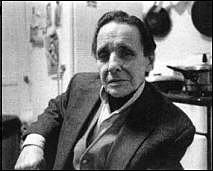
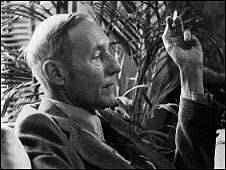
The putative godfathers of the Beat Generation were
William Burroughs (left), author of Naked Lunch, and Herbert Huncke
(right), Times
Square junkie and unknown writer - both were unabashedly gay.
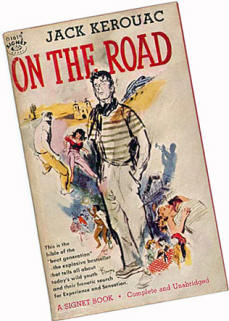 Publication
of Kerouac's On the Road in 1957 marked the Beats debut for most
Americans. There was a tremendous outpouring of writing from the
likes of
Jack Kerouac,
Lawrence Ferlinghetti, Allen Ginsburg, Gregory Corso - and
many others then less well known. Neil Cassidy, though not a very
productive
literary talent, occupied an iconic niche: a wild man/free
spirit/lunatic/druggie ideal. He was also bisexual. Most of these men achieved
their reputations as poets, though Kerouac is more famous as a novelist.
Ginsburg's long poem Howl enjoyed great underground popularity (and was
the focus of an obscenity trial) and the novels of Kerouac, such as On the
Road, Dharma Bums and The Subterraneans rattled a great
many
Publication
of Kerouac's On the Road in 1957 marked the Beats debut for most
Americans. There was a tremendous outpouring of writing from the
likes of
Jack Kerouac,
Lawrence Ferlinghetti, Allen Ginsburg, Gregory Corso - and
many others then less well known. Neil Cassidy, though not a very
productive
literary talent, occupied an iconic niche: a wild man/free
spirit/lunatic/druggie ideal. He was also bisexual. Most of these men achieved
their reputations as poets, though Kerouac is more famous as a novelist.
Ginsburg's long poem Howl enjoyed great underground popularity (and was
the focus of an obscenity trial) and the novels of Kerouac, such as On the
Road, Dharma Bums and The Subterraneans rattled a great
many
1959 cover, Signet paperback
establishment literary critics. Most of these works had bi- and
homosexuality entwined in their plots. I still have my marked up copies from
these years of Howl and Kerouac's book of poems, Mexico City Blues,
both of which continued the work started by Miss Sweeney with Wallace
Stevens in English 101.
For many teenagers of my generation "Rock Around the
Clock" and Rebel Without a Cause had made major impacts on our youthful
selves, and for some of us Howl amplified their reverberations a few years
later. Of the Beats it is Ginsburg's work
that has had the most staying power
over the years - as did Ginsburg himself. He sustained an interest in Buddhism, and
more than three decades later, in the
late 80s, I met him at Tibetan Buddhist gatherings in the East Village.
This counter-culture was not politically
confrontational, but was marked by individual lunatic bursts of sexual and
social conduct contrary to the prevailing norms, indicative in part perhaps of
drug paranoia and the frustrations of the 50's Cold War atmosphere. This
movement's influence on gay people was limited to college campuses and enclaves
in NYC and San Francisco, as far as I know. But it was out there, and its voice
was liberating to many who heard it. And its refusal to treat gay sexuality
with shame gave something like a fragile "validation" to homosexuality. It's
probably the case that the Beat phenomenon was more widely accepted as an
inheritance by gay men many years after it had peaked creatively, though the
fictional world of
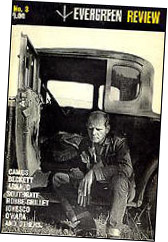 Rechy's hustler protagonists that began with his 60's
novels seems like an early gay descendent of the Beats. However, for me at
this time the Beats were something like the biblical "voice crying in the
wilderness," or in this case "howling."
Rechy's hustler protagonists that began with his 60's
novels seems like an early gay descendent of the Beats. However, for me at
this time the Beats were something like the biblical "voice crying in the
wilderness," or in this case "howling."
(right) Evergreen Review, issue 3,
$1.00
This was the time that the Evergreen Review and
the Village Voice (a far different journal then than the pretentiously
intellectual publication of later decades) became part of my reading.....and later even
One, the homophile magazine the Mattachine Society, which had begun
appearing in 1953.
Learning about the Beats, while sniffing around the edges of jazz and the
incipient folk music revival, however interesting it may have been, was also
part of a self-conscious search for a direction ("definition" or even "image"
might be better) counter to my Freshman year attempt to conform to fraternity
expectations and
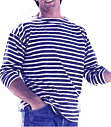 so-called Ivy League styles and attitudes. There were
some wardrobe innovations, as well. I sent away for a catalogue from the
Village Squire in New York - which had been confirmed as a gay store, which I
had suspected - and I parted with a chunk of my summer earnings to purchase a few
definitely non-collegiate items. These were a couple of new style tapered
tee shirts (one "tomato" and the other black), a blue and white striped,
boat-neck French
sailor's jersey and a pair of black jeans. But if these purchases suggest "bohemian", it was definitely more by way of the Hollywood musical An American in Paris
than the Beats. Next, my very short cut, brushed flat hairstyle was
allowed to grow out - and grow out - until it came as close as I dared to
being a length that suggested
it could be combed into that most non-collegiate item of all, the DA or ducktail
- pure high school and James Dean!
so-called Ivy League styles and attitudes. There were
some wardrobe innovations, as well. I sent away for a catalogue from the
Village Squire in New York - which had been confirmed as a gay store, which I
had suspected - and I parted with a chunk of my summer earnings to purchase a few
definitely non-collegiate items. These were a couple of new style tapered
tee shirts (one "tomato" and the other black), a blue and white striped,
boat-neck French
sailor's jersey and a pair of black jeans. But if these purchases suggest "bohemian", it was definitely more by way of the Hollywood musical An American in Paris
than the Beats. Next, my very short cut, brushed flat hairstyle was
allowed to grow out - and grow out - until it came as close as I dared to
being a length that suggested
it could be combed into that most non-collegiate item of all, the DA or ducktail
- pure high school and James Dean!
And, as a
more personal affirmation of my new, but not at all confident, outsider status, I
attended a rock 'n' roll show in a downtown arena that fall. Except for
Big Joe Turner - and the no-show of Fats Domino, the headliner - this second,
and last rock 'n' roll sho w of my life has left no enduring memories.
This event
did bring me, however, about as far from my previous year's adventure in college
and fraternity
w of my life has left no enduring memories.
This event
did bring me, however, about as far from my previous year's adventure in college
and fraternity
(right)
'57 Buffalo event
conformity as
you could get. In addition to being too teenage from a college student's point
of view, racially mixed R&B shows and movies were getting a not entirely
undeserved reputation for
violence.
In the era of the button-down Ivy League look or the hardly less conservative
campus alternative of "traditionally" styled clothes for the more provincial
young adults, my Village Squire acquisitions stuck out like the
proverbial sore thumb.
They ended up for the most part, as I recall, being worn after classes to the
dining hall or for hanging around in my cottage residence. If these changes
suggest that I should have been hooking up with the campus bohemian fringe, derisively
referred to as "bohos," the most easily identified ones were from the New York
City area and as remote and intimidating as if they'd stepped out of a UFO.
And despite my exposure to the influence of the un-conventional Carrie and
Casey, or that of my two gay friends Bill Kenner and Bill Curry, I wasn't the
stuff that flamboyant rebels were made of.
SODOM
1/CHURCH O 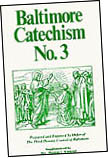
I was raised in an Catholic Irish-American family, and
my own religious faith and practice as I grew up were much stronger than that of
either of my parents. However, in addition to having a devotion to the ritual
life of the church I also had a rather legalistically toned intellectual
interest in it as well. I had had doubts, of course, about points of doctrine
or church history, and I was not afraid to bring them up - priests were not people
I was raised to be afraid of. As I was pretty bright the parish priests would
let me borrow books from their libraries or would have informal discussions with me.
Up to this point I had been able to resolve my doubts, or live with them more
or less comfortably.
However, near the end of this school year I came to the
conclusion that homosexuality was an ineluctable part of my nature. Despite past years
of confessing the sin of committing homosexual sexual acts and promising sincerely
to attempt to avoid repeating them (followed at one point by an interval of over three years
of having heterosexual sex exclusively - a far easier sin to confess to), here I
was again screwing with a guy. And this time - I think because now it included
kissing and caressing, plus an incipient understanding of "gay life" as opposed
to the clinical gruntings of the "homosexual" - I knew that this was an
essential part of me. It clearly was not just the euphemistic "bad habits" and
"bad companions" of past priestly counseling. Nevertheless, it was indeed
still a major sin in the
Church's eyes, and the rules of the game were quite clear.
Once I allowed it to sink in that this was not just about things I
was doing, but about who I was, I also knew that it was impossible for me to
go into the confessional and declare truthfully that I had sinned, profess
contrition for those "sins" and affirm that I would do my utmost not to repeat
these sins. The alternative, of course, was to simply say nothing at all about
sex with other males. However, in this case I was hoisted on the petard of my
legalistic bent regarding the Church. If having homosexual sex was a grievous
sin, another was to withhold or lie about actions which one knew were ranked as
major sins, and to deceive the priest in confession and receive absolution
through deception. To do this was to defile the Sacrament of Penance (the rite of
the confessional). And if one then received communion with the mortal sin of
homosexual acts on one's soul, compounded with the major sin of defiling the
Sacrament of Penance - well, you had now capped off this miserable progression
with gross sacrilege against the Eucharist, i.e.., the Body and Blood of Christ.
Very, very heavy stuff for a believing Catholic - akin to using the pages of the
Bible or Torah as toilet paper for a Protestant or Jew, perhaps.
It is important to remember that this occurred in the
mid-1950s. There was no public discussion or questioning to provide a basis for
doubting the traditional view that active homosexuality was one of the gravest
of sins in the Catholic - and entire Christian - faith. And popular culture
certainly reflected that view in secular/profane terms. There was nothing
remotely like the gay or lesbian support groups, which might have helped people
through the process of self-acceptance, including any spiritual dimension. I
was out there twisting in the effing breeze on my own.
R.C. confessional 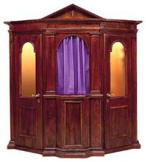
A Saturday evening finally came when I trudged to the
Catholic chapel on campus and sat in the back until everyone else had gone to
confession. I went into the confessional, recited those offenses I recognized
as sins; then - after a long pause - I told of having sex with Bill. The priest
did his best to counsel me against this sin, and then came the crucial words to
the effect that I must express sincere contrition for these sins and promise to
do my best never to repeat them. I then put the elephant on the railroad
track.....I replied, "I, cannot." This little
announcement stopped traffic, and I might have believed the entire world as
well, so momentous was this declaration to me. The priest was not a fire-breathing
monster, and he did his best to explain the matter to me from the viewpoint of
the Church. But I could only respond that I was certain that being homosexual
was "the way I am", and that I was not prepared to live a celibate life, nor was
I willing to profess the required contrition for something I did not believe was
a sin. The priest, of course, could not give me absolution.
In a subsequent discussion in his study he explained
what I already knew: that I was automatically prohibited from receiving the
sacraments, which most importantly meant receiving communion at mass - without
committing damning sin. But hadn't that been exactly the line of reasoning
which
had brought this confrontation about in the first place? He strongly
recommended therapy (with a Catholic therapist), but I demurred again. Though I
had been dealing with homosexuality in religious terms, it seemed immediately
right when presented with this suggestion that just as there was nothing to be
forgiven for, so there was nothing to be cured of. (I have
to say, for
years I have been fascinated by how easily that second acceptance came, given
that the religious confrontation took years for me to deal with. It
suggests to me that I had probably been giving sexual orientation - or however I
thought of it - secret consideration for more years than I had ever been able to
be honest about. ) At the end of my conversation with the priest we were
in all respects back to square one, except that now I looked to be turning in my game token.
This stand would essentially reduce me to the position
of passive observer in what for Catholics was the most important part of their
religion, the mass. I have always been grateful that this priest talked to me
calmly and treated me with courtesy, by doing so I think I was probably saved
from an enormous dose of personal resentment against the Roman Catholic Church, which, from what I have
seen over the years, is an energy-sapping dead end for many ex-Catholics. When I left he shook my
hand, wished me well and said he would pray for me. No, I have never thought
that he was a closet case. Just a decent person.
(For those few who might remember this era on the S.U. campus, this priest was
not the Catholic chaplain of the time, Fr. Ryan. Ryan was a witty, urbane
man, but also more than a bit smug, extremely hostile to
the "neo-pagan" influences on campus, and steadfastly opposed Catholic students
having even the most superficial involvement in any inter-faith doings.
The priest who heard my confession was a visiting one from nearby Lemoyne, a
Jesuit college. Had I had this experience with Fr. Ryan I have no doubt
that it would have been a far, far more negative one.)
I can clearly recall leaving and walking down the
street in a kind of daze. But with my strongest feeling being one of immense
relief. Understandably, I think, I was reacting to this as a one off event, the
"well, that's over with" reaction. I had never intended to stop attending mass
on Sundays, but sitting there the next time, I felt completely reduced to the
role of an outsider. I experienced sadness, relief, resignation, longing and
more - totally confused currents of emotion.
In the days and
months afterward I felt an increasing sense of being uprooted. Reaching the point
where I had been able to cease denying the combination of Me & Homosexual had
been, to some degree, a kind of romanticized expansion of myself - and, probably
not entirely divorced from a prideful and masochistic enthusiasm for religious
legalism. I felt
like there was a tearing in my life - in me. I was pulling loose (or being
shoved away, I was never sure which) from something which was a deeply embedded
part of my life. Very soon I was to endure another such event that was to be
terribly painful, this time with my family. It would take a very long time to find
other landmarks to reckon by.
I did not even think to "come out" to my family, of course. The number of
gay people who told their parents of their sexual orientation was miniscule during this era. There were almost no tales of this news being
accepted well, usually it signaled severe and long term ruptures in family
relationships. Most of one's energies went into camouflaging the fact you
were gay - attempting to pass was the norm. (In any case, the expression "coming out"
as it was used in the late Fifties had a rather different meaning. It referred to a person admitting their sexual orientation to themselves and
beginning to participate in gay life - like a debutante coming out to Society.)
However, like other gay guys, I did confide in a straight friend. My
best friend from Freshman year, Dick, was a guy I was still friendly with.
I told him I had something important that I wanted to talk to him about, and we
met in the early evening and went for a walk. When I finally managed to
get to the point and said I was gay, he said that he was afraid that was what
I'd been getting at. Dick's reaction was more strongly negative than I had
expected. I remember that he said that it was bad to be homosexual -
a "sin"; "dirty" was the most painful word. He was quite upset.
I had suggested we turn into a park, because I thought we would avoid bumping
into anyone we knew. Suddenly he seemed panicked, and said
something like, "Let's get out of here. I want to leave." He
practically fled from me. Though I didn't see him often, we did remain
friends - or at least friendly, though we never mentioned my being gay again.
It probably bears emphasizing that in
the America of more than half century ago there was almost no maneuvering room in regard
to homosexuality - and the same was true of pre-marital sex, unwed motherhood,
and interracial dating/marriage among other things. These activities were
patently wrong as far as the overwhelming majority of people were concerned, and
furthermore, they were deeply wrong. Whenever possible people often preferred
to deny that such things were true about people they knew even when it was
blatantly obvious they were; the alternative was to ostracize the offender in
ways which were so customary that they required no overt considerations or
discussions of how to go about it. Expressions of sympathy (rather than pity),
much less anything so positive as to approach tolerance, provoked disapproval
and censure, ensuring that most people wouldn’t stick their necks out. To hear
that so-and-so had "left town" was many times a euphemism for the exile that the
offenders chose - or were forced into. Good people "moved," bad people "left
town."
I understand now what I had barely begun to grasp then. And it echoes an
observation that a Japanese woman made to Donald Richie regarding his lifetime
in Japan: I was to discover the benefits of being an outsider. And I
would not have had I not been excluded. The stigma of homosexuality, I would discover,
was a much a baptism as a burial. And, I am inclined to think, it is exactly
this that has made gay people outstanding contributors to the mainstream
society - the empowerment of being in a world, but not of it.
(right) Catholic Worker
A-bomb protest poster
I think this was the year that I joined the SANE
chapter (Society for the Abolition of Nuclear Explosions) on campus. There may
have been a couple of dozen members, though I never saw that many at one time.
Organizations like this were suspect even though the McCarthy frenzy had peaked
some years before. My participation was close to nil; however, through it I was
exposed to the life and work of Ammon Hennacy, the
Catholic-anarchist-draft-resister-you name it. (And Dorothy Day and the
Catholic Worker movement too.) I certainly didn't follow in the footsteps of
the master, so to speak. But it was the first time, I think, that I had been
attracted to any kind of political or social thought that was out of the
mainstream. I wonder, but there's no knowing, of course, had I not already felt
myself moving beyond the pale by virtue of my homosexuality, would I have been
as receptive to Hennacy - or to other thinkers and ideas in later years. I
doubt it, I think I would
probably have been too eager for acceptance and approval.
Summer vacation was back to factory work again, but
this time on late night shift. My schedule was a great stroke of luck on two
counts. First, it collapsed the amount of time I was with my parents to the
minimum. Since getting through the rocky adjustments of my Freshman year and
settling into the less intense living situation of the cottage environment the
next year, I
was beginning to feel what was a nascent sense that "home" was no longer
where my parents lived. I had learned to live on my own and I was liking it
- in
fact, the change was wonderful. I knew full well that I was in no way the
person they thought I was, and far less so than before. Second, there was no
escaping that a big plus of this work schedule was that it pretty much reduced
the time available to spend with my girlfriend to weekends. The relationship
had changed for me, of course. The whole idea of marriage and family was a
vanishing blur, and sex an obligatory performance. After a lifetime of
seemingly internalizing conventional views, I had forced myself to be
honest with my church. But the largely happy four-year
relationship with my girlfriend was another matter. How do you end
something like that, totally trashing someone else's plans and dreams, without
giving an honest explanation? I was in a paralysis of cowardice.
It seemed that I didn't have a secret as much
as I was a secret. I no longer felt at home in any aspect of what
had been my community. I liked working through the night, sleeping all
day; getting up in time to have dinner with my parents, and glad as sunset
neared to be
walking down the tree-shaded streets to the factory again.
JUNIOR YEAR:
THE GAY UNDERWORLD
1958 is the year Pope Pius XII
died. This man had been Pope since 1939, and his austere figure had been a
major presence on the world stage during WW II, and in the post-war period he
had become a symbol of opposition to Soviet Communism. And he certainly
epitomized the Catholicism I was raised in. In the more mundane
world the first "gold" records are given out, stereo recording is in and the
cost of a first class letter skyrockets to four cents.
 This year I moved to a Queen Anne style cottage
complete with tower, in the commercial part of the campus. The Orange was
located just down the street on South Crouse Avenue. I began to suspect that
some of the students who hung out there were gay.
This year I moved to a Queen Anne style cottage
complete with tower, in the commercial part of the campus. The Orange was
located just down the street on South Crouse Avenue. I began to suspect that
some of the students who hung out there were gay.
Queen
Ann style house
One night when I was sitting at the bar alone another
young guy sitting a couple of stools away looked at me a few times, and then he
moved over and started a conversation. His name was Joe Livorno, and though he
was from Jersey City he was now only a part-time student and worked downtown as
a ballroom dance instructor. He invited me back to his room a few blocks away,
and though we kissed and groped each other for hours we didn't have sex. Not
then or ever. However, Joe turned out to be not only more worldly-wise about
gay life than Bill Kenner of the year before, he was also a much more straightforward
guy. Joe was my first real gay friend. (And to this day I remember
him with gratitude and fondness.)
It was about this time that I forced myself to face
the fact that I must end the four-year relationship with my girlfriend.
There was nothing else to do, I was just postponing that horribly
painful event. Her
expectations were the same as they had always been; mine had been overturned
tumultuously. It turned into a wretchedly, miserable breakup
for both of us that extended over several weeks, and for me it was a
guilt-ridden one. She was extremely hurt by it, and baffled at how my affection
for her could have just evaporated.
There was no way in the Fifties, not
even the thought of it, that I could tell her what had happened with me.
On my side, my life had been all laid out in my imagination - marriage to this
girl, children (four or five, as I recall); quite possibly a job in a city near
my hometown, but in any case, an adulthood and old age lived in a similar place,
happy and securely middle class, as my parents had not been. But now
what? I really didn't know. Straight life - as I had learned about
it, and accepted it - was full of slots, and by and large people found this one
or that one without much problem, and even changed some of them over the course
of time. If one's life was not totally predictable, its course was usually
socially acceptable - even if the sloppier moments caused strains.
This reassurance disappeared. Being gay erased almost all of the content
of my future as I had imagined it, and there really was nothing in my head that
gave me a clue what you did with a gay life. The nearest thing to a clue
was the life of a straight single person, but this was a melange of
recollections of people I had grown up with, social stereotypes and romantic
tales. Once you discarded the Lawrence of Arabia type heroes, the everyday
examples that were left were neither attractive nor particularly helpful. Yes, I knew about
the blackmail, gossip, criminality, etc. that circled around a gay life, but if you held that at bay - and the
likelihood of life as a disaster has about the same reality to a young person as
death - what the fuck did you do? Where were the maps? I still
clearly remember that at this point I was quite puzzled by this, but sometimes
it was more than that - something closer to intimidated, maybe awed.
 (right) Crouse College at S.U.
(right) Crouse College at S.U.
Not too long afterward that fall I had another
encounter in the Orange. This time a guy who was sitting in a booth with two
friends kept looking at me. Finally he came up to me at the bar and asked me if
I wanted to join them. His name was Tom R., he was a grad student. He and
his friends were from well-heeled families and tony suburban backgrounds. They
were totally involved in the Greek fraternity system, Tom even belonged to that
best-fraternity-on-campus. And as it came into the open through innuendo and in
jokes that we were all gay, I learned Tom and his friends also had some
experience in the gay worlds of New York and Philadelphia, and they even
knew about a gay club in London (the Rockingham?) and one in Amsterdam too.
(By the way, I have, rather surprising to me, seen the question
raised several times in print - even by Larry Kramer of all people - whether "gay" and "gay life" were
terms used in the Fifties. They were certainly in common use by all the gay
people I met during these years.)
Later Tom asked me to leave with him, which I didn't
get the drift of right away, and everyone burst out laughing. After we'd had
sex - which turned out to be an unsatisfactory business - we smoked and talked
in bed quite awhile, then he remarked as he got up to make coffee, "I'm
going to get married, but you'll always be gay." I did not need to call
Daniel from the lions' den to tell me that I had been weighed in the balance and
found wanting. But it seemed to have nothing to do with not-so-great sex. I
had gotten my first dose of what is now termed internalized homophobia. It was
never far below the surface in this crowd, and some of the other guys in this clique
sometimes made passing references to lives that would eventually include a wife, kids
and a house with a white picket fence, and the country club, of course.
Tom introduced me to my first gay cry-in-your-gin
album, and it was not Judy Garland, but Judy Holliday's
Trouble is a Man.
And he also played Satie's Gymnopédies, which I had never heard before.
I still enjoy both, so this unpleasant one-night stand wasn't a total loss.
Despite this ill-omened beginning I began joining Tom's
clique when I went to the Orange and found them there. Joe worked evenings so we
couldn't often socialize at night. One time, however, he came in when I was
sitting in a
booth with Tom and his friends. Joe nodded hello, but took a seat at the bar, I went over and
invited him to join us. He looked over at them, then said to me, "No thanks,
they're not nice people." Before I went back to join them he added, "Be
careful of them."
And he was right.
At first I'd thought the group was Tom
R.; another grad
student, David B. (Tom's recent ex-boyfriend) and Reg R., who was a junior as I was.
However, I soon came to know that it often included two girls - L., who claimed to be bisexual and had the disposition of a scorpion enduring a root canal, and
C., who was straight and had a crush on David and whose defense against L. was to
fawn on her. They too came from well-off suburban families with professional or
business backgrounds. The
combination of Tom, David and Reg, especially when the two women were present always manifested a
good deal of nastiness - a kind of free-floating maliciousness - which I never understood...and was often the target of. Probably I was a natural magnet for it in this group:
I was the only one from a small town, the only one with a Catholic background
and an unsophisticated kid who knew shit about the gay world.
In other words, a bubbling stewpot of internalized homophobia.
Though I don't recall that Tom, David or Reg had spent
any time abroad, their gay lore claimed that in Europe homosexuality was quite
accepted and open - in obvious, painful contrast to our present circumstances.
A couple of other grad student fraternity brothers of Tom's, Ed and Tim, would
sometimes show up at the bar.
Both of these had lived for some time in Europe - Ed while studying and Tim in
the army - and each of them had stories of gay adventures and boyfriends while
there. They were very easy-going, unsnobbish guys,
and something else which set them apart was that neither one pretended to a
future that included marriage and children.
Almost immediately the original trio
taught me about something very
strange called "camping." Reg, though the youngest and most recently out, was
its most eager practitioner. Camping as practiced by Reg was a demonstration
of stop-time choreography. First, he raised his eyebrows to his hairline while
rolling his eyes heavenward. Next, he flapped his hands in what looked like an
imitation of the pterodactyl taking flight in Prehistoric Women. Finally,
in a rasping kind of mantric invocation (it was the voice Bette Davis, when it
wasn't Tallulah Bankhead, I learned later) he would utter, "Get-you-Ma-ry."
This, it turned out, was only camping's essence - something like Om in
other contexts, perhaps - and this style could be applied to almost any
put-down to increase it's humor and sting.
I also learned that camping plugged into something
like a collective gay cultural consciousness, consisting of particular (mostly) female film stars
and their movies and anecdotes and stories related almost exclusively to the
world of entertainment. A lot of this content was familiar to me from the hours
and hours spent in the local movie theatre as a kid (plus the old films on late
night TV), though I really wasn't
quite "getting it" in this context. Camping drew deeply on the stereotype of
woman-as-bitch.
Soon I heard about "Miss Eisenhower."
She was not a mad daughter Ike and Mamie kept hidden behind locked doors in the
attic of the White House. "She" was President Eisenhower
himself! Ol' straight-laced
Ike! Okay, got that one. Rock Hudson and Tab Hunter were also "Miss," as were
an endless number of other male Hollywood stars and celebrities, all of whom
were really gay. (Almost every famous person who came up in
conversation, whether adored or hated, was really gay I came to learn.)
And it seemed that every gay man was "Miss" So-and-so, whatever his surname was,
and often blessed with a female sobriquet as well. Finally, any man one
disliked could be brought down with a "Miss" and a "she."
Through this crowd I discovered there were other
little cliques of gay students, separate groups of two to a half dozen friends.
These groups were diffident about each other in the bar and inclined not to mix.
I think there may have the notion at work that a few guys hanging out together
drew less attention. Whereas, if one or two guys were identified as gay
and they were part of a large group, then everyone would be labeled.
Contrary to the popular saying, it seemed that in this case there was no "safety
in numbers," but rather the opposite. Thus, gay life on campus was
very, very furtive. The majority of gay guys went to some lengths to date
and appear to be unquestionably straight, while a few dropped out of mainstream
campus life to live as they chose to - very quietly - and avoid having to live double lives.
Joe had taken this latter route, and there were a few others I learned of.
The downstairs bar at the Orange, despite its small size, was a
favorite drop in spot for many students, and it was often extremely crowded;
thus, the atmosphere was very uptight for gay students: You had to be concerned
about being overheard, and also, at any point someone's straight friends might
come in and sit down with you and the guys you were with. Either of these
events killed the night for any gay socializing. Often gay men who knew each
other to be gay, e.g. through a mutual gay friend or from seeing each other in a
gay bar in New York, took pains to avoid even the slightest mutual
acknowledgement of their shared sexual orientation on campus.
There were
two bartenders, Harry, a plain-faced man in his forties or fifties with beagle-eyes, and Fergie,
a Korean War vet, I believe, and while a student
(as I recall), he was older than most. Both were straight, but totally
aware of the suppressed gay life that was going on in the place. To this
day Harry remains my picture of the consummate bartender -- affable, intelligent,
always seemingly absorbed in one or more conversations with customers, but almost
preternaturally aware and on top of every vibe in the room. Fergie had not
been the second bartender when I first started going to the Orange, but arrived on the scene in my sophomore year, perhaps. He had intense,
hawkish eyes and was a tall, big-shouldered, broad-chested guy, and to me he
looked very on edge - and unfriendly - behind the bar at first. However,
his demeanor changed - under Harry's tutelage I suspect - and he acquired his own
version of bartender's "cool."
Nevertheless, some extremely careful cruising and
picking up went on at the Orange: that was, after all, how I found myself in one of the
gay cliques. And despite the fact that this little group was often unpleasant and very
caught up in money, social class and bitchery, I continued to join them because they were
the only group I had an entree with.
INTRODUCTION TO CAMPING 101

"Get you, Mary."
Forgive me, I cannot resist saying it: I was not a
happy camper. But camp I did...well, because that was what you did if you were gay.
Right?
This was not something that Joe had been into, though
Bill Kenner I realized had come close to it. I found it pretty disorienting. One of
the hardest parts of growing up had been the business of believing in myself as
a guy (for lack of a better term) even if most of the details of the more
aggressive images of maleness didn't fit me. Possibly the last part of that
business was to be able to be my own kind of a "guy," but a gay one. But this
group of gay men strongly reinforced the image the straight world had of gay
men: men who were, or wanted to be, women. The arch "femaleness" of the argot
brought the whole business into question again, in addition to which the
unrelentingly negative tone of camping had a deeply depressing effect on me. The last
straw was that everyone in the group seemed to accept (though it was not
discussed at length) the idea of homosexuality as something that had gone wrong,
incurable perhaps and therefore to be lived out; but nevertheless, a kind of
medical deviancy at least. The assumption I had made while talking with the
priest that if I wasn't a sinner, I wasn't sick either looked to have been
a case of jumping to the wrong conclusions. I mean, shouldn't these guys know?
Reg seemed quite pleased with the Oedipus complex,
and certain that it was the overweening influence of his mother that had
produced his condition. Several years later there was a graffito in the men's
john of the Lion, a straight bar on Christopher Street: My mother made me a homosexual.
Someone had written below it: If I buy her the wool will she make me one?
Unfortunately by this time I had lost track of Reg. Alas.
I mean, rilly, Madge, why is it called gay
life?!
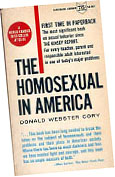 The work of Dr. Evelyn Hooker, which began to
undermine the
medical profession's stereotype of homosexuals as sick people came out in 1957,
however, I did not hear of it until the 60's; nor did I read Donald Webster
Cory's (Edward Sagarin) The Homosexual in America (1951) until the 60’s
either. Either one would have given me a broader and more positive view of gay life than the
one I was getting.
The work of Dr. Evelyn Hooker, which began to
undermine the
medical profession's stereotype of homosexuals as sick people came out in 1957,
however, I did not hear of it until the 60's; nor did I read Donald Webster
Cory's (Edward Sagarin) The Homosexual in America (1951) until the 60’s
either. Either one would have given me a broader and more positive view of gay life than the
one I was getting.
cover of '57 paperback edition
Reg seemed almost obsessed with the "she-ness" of it
all, and though Tom and David were a great deal less so, the predominate tone
of the group's modus vivendi was unrelentingly catty when not just plain
bitchy. The gay world looked to be a bizarre and mean-spirited place. Over
time I discovered that my experience and my feelings paralleled those of many,
many guys who had a similarly claustrophobic introduction to gay life in the
Fifties.
GAY LIFE IN
DOWN IN THE CITY
There were two gay bars in downtown Syracuse that we
went to once, maybe twice. One of them, Bersani's, was a dark, sleazy dive, and
sometimes small groups of straight students (usually all guys) would go there to
look at the queers. But not a few times someone in the group was
discovering his own homosexuality
and really trying to get a sneaky look at the gay scene. What a way to get it!
Bersani's gay clientele were living beyond the edge -- very effeminate men and a
few butch women, drinking themselves into oblivion with flamboyant acting out
that ping-ponged from misanthropy to self-hatred. The other bar, the Bell Room, (the
place Hank the geology instructor had briefly taken me into) wasn't dingy and
was patronized by seemingly more together people in comparison. Perhaps because
it couldn't as easily be distanced as a touristic carnival freak show this bar
got college guys dropping in much less often and was, thus, safer to go to if you
were a gay student.
There was a third gay bar in town, a private "club" on
the main drag which had all the appearance of having been a speakeasy or gambling
club at one time. The entrance was a metal door between two stores; when you
opened it you were faced with a long flight of metal stairs, at the top of which
was another metal door with a shuttered peep hole. Opening the door downstairs
tripped a buzzer as I recall, but in any case just walking up the metal stairs
was announcement enough and the shutter snapped open and your approach was
watched by a pair hard, dark eyes. These belonged to Rose, a huge
Italian-American bull dyke, who was always dressed in flower print house
dresses.
The place deserved to have been recorded by a
Toulouse-Lautrec, but one with a good dash of Georg Grosz in his
temperament, perhaps.
The majority of its customers were working class
lesbians, a group of whom worked in commercial laundries - and these were women not to be
trifled with. There were gay men too, a somewhat more varied assortment: some
of the “flamers” from Bersani's, a few from the other bar and the occasional odd
ones - like a couple or three wide-eyed college students, or some polished-looking
slightly older guy with a professional job.
DAISY
And then there were the totally unique individuals,
one Daisy certainly being the most memorable. Daisy was probably what would
have been called a bag lady decades later. She spent a lot of her time in
a cheesy cafeteria, and I am guessing that since little groups of the town gay
guys would use the same place as a late night rendezvous point that that's how she
found the club. She was a very corpulent woman in her sixties, always under the
weather or maybe just not "right in the head," but a gentle decent soul (for
the most part), who was good-naturedly tolerated by everyone.
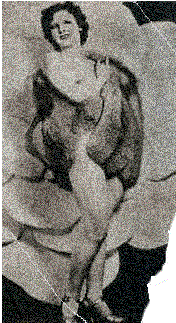 She carried a clutch of shopping bags, and her scrap
books. The latter were filled with memorabilia from Daisy's days as a stripper
in the 30's - and when the mood struck her she could be quite insistent
about sharing them. Daisy had another mood that could come over her.
She carried a clutch of shopping bags, and her scrap
books. The latter were filled with memorabilia from Daisy's days as a stripper
in the 30's - and when the mood struck her she could be quite insistent
about sharing them. Daisy had another mood that could come over her.
(no, not Daisy herself, but similar
to her photos)
The club was one large room with booths and a dance
floor (dancing and privacy were its biggest drawing cards) and through a door in
the back were the toilets and an unused kitchen. This door was actually a small
open archway, which on the side facing the bar and dance floor had an ornamental
roof that projected out over it. Perhaps its design suggested a stage to
Daisy. Whatever the reason, there were several times when she disappeared -
presumably to the bathroom - only to slowly emerge from the darkness of the
kitchen, undulating her way through the archway and the bright lights as she
discarded her clothes. I doubt that the legendary Sally Rand unleashed such delirium among
her fans. However, Jimmy the bartender was not a party to it. But it was no
easy task when Daisy was possessed by Terpsichore for him to bring her back to
the world of shopping bags and scrapbooks. Sometimes the two of them would get
in a serious tussle before she could be forced back into the kitchen - and her
clothes.
The first time I was there was when the little group
of us from the Orange went downtown, and I was introduced to the city gay bars.
However, later on Reg and I went back by ourselves. He got involved in a
flirtation with the bartender, and I got to know the dykes. Just how that began
I can't remember, but after a while I was dancing with them - even little Dotty,
who was Rose the Doorman's woman. Dottie was often out of it. I think working
a hard manual labor job all day long and then trying to booze and stay up with
Rose on her job was more than she could handle. She usually dressed in jeans
and a pea jacket, and often ended up collapsing into sleep in a booth. A few
times I saw Rose watching her from her post by the door, then come lumbering
over in her huge flower print dress to bend over and literally lift Dotty out of
the booth with both hands and hold her up like a doll. She covered her with
kisses, Dotty would briefly come to and smile, then Rose would plunk her back
down in the booth and to sleep again.
I don't know if the place was licensed or not, but it
did serve hooch after hours. I saw two uniformed cops come into the place one
night (scared the piss out of me) and they went into the kitchen with Jimmy.
They came out very soon with a couple of small paper bags. Sometime later Jimmy
told Reg and I that the cops came in for "lettuce sandwiches." Huh?
Sandwiches from a non-working kitchen? Oh, right..."lettuce."
Though Syracuse was more than a hundred miles from my hometown, one night in
this upstairs place I ran into the brother of a young woman I had worked with
during high school. I was really surprised as I would never have thought
he was gay. Although he was big, brash Sicilian guy, at least half a dozen or more years
older than me, he'd always been friendly and I was glad to see him. He, on the other hand, clearly wished he
were dead. Immediately he begged me not tell his sister he was gay if I
ever ran into her. I would never have dreamed of doing such a thing, and,
of course, it would certainly say as much about me as him if I were to do anything that
cruel. I told him this, but he didn't seem very reassured and asked me at
least twice more not to say anything to her. My being there had clearly
ruined his night and scared the wits out of him.
 Joe, who was a part-time student, didn't do well first
semester, dropped out and went back to Jersey. Later in the year I ended up
meeting Dominick, an older undergrad student who had bowed out of the Catholic
priesthood and was beginning his education all over again. Once he sneaked me
into his room at the Y downtown.
Joe, who was a part-time student, didn't do well first
semester, dropped out and went back to Jersey. Later in the year I ended up
meeting Dominick, an older undergrad student who had bowed out of the Catholic
priesthood and was beginning his education all over again. Once he sneaked me
into his room at the Y downtown.
The Syracuse YMCA
I also got picked up in the cafeteria of the
dorm I was eating in that fall by Ken, one of the grad student Resident Advisors in
that dorm. He invited me to his room, where we had nervous groping
sessions. (The first time it happened he was sitting in his underwear on
the bed with a blanket pulled over his legs up to his waist. When he took my hand
and pulled it under the blanket, putting it on his erection, I was shocked out
of my wits. Not by what he did, but because I hadn't had a clue in the
world that human cocks were ever that huge! I had encountered my first
donkey dong.) We only had sex once, in a motel in Ithaca while
we visited some friends at his undergrad alma mater for the weekend, and he was
terrified we would be found out. He was convinced that if we (two men)
soiled the sheets that the motel would contact the university! While both of these guys
were very decent, they were extremely concerned with cultivating as
straight-appearing a social life as possible - and in the case of Ken, the Resident
Advisor, so paranoid about being discovered that he was literally developing ulcers. The
level of defensive play-acting that permeated their
lives was unbearable to be around. Without actually making a conscious
decision, I was about to move rapidly move to the fringe of campus life.
Nevertheless, at the moment I was hanging out in
the Orange with a group of gay "friends" who treated me like a Mickey-the-Dope,
and I'm going along with it. Not good.
There was one gay faculty member, a graduate French
instructor, who hung out in the bar on a daily basis. John was known as a queer
and took no pains to pretend to be otherwise or deny it. He was a tall,
pinched, unattractive man - very bright, but with a disposition like a rusty
razor. He was "popular," (e.g. with Harry and Fergie, the two bartenders who
were older, hip straight guys,) but with only a few exceptions
his was mostly the dubious popularity of a
freak. John was practically an exhibit, but he regarded the gawkers and fawners with
open contempt, and sometimes he was involved in very nasty, nearly violent
scenes - not a few of which he provoked.
Some of John's friends from off-campus would stop in briefly to chat with him at
the Orange once in awhile. These guys had jobs in town, and perhaps for
that reason acted as cautiously as we gay students tried to. Once the four of
us were invited to a party one of them was giving. I was a bit puzzled by
how concerned they seemed to be that I in particular would be sure to come.
When we arrived on the appointed night, the host immediately pulled me aside:
there was a certain out-of-town guest he wanted me to play a kind of verbal
cat-and-mouse game with for a few minutes as a joke. It was the minister
of the Baptist church in my hometown.
John ommitted suicide in 1958 or 59 by throwing himself out
of a window while on a visit to New York City.
In retrospect the attitude of the two bartenders toward the gay scene has come
to seem more curious to me than it did at the time. The Orange was not, at
least in my estimation, a routinely easy bar to handle, as a neighborhood tavern might
have been. The clientele was mainly guys in their late teens or early
twenties, many dealing with an unlimited supply of booze for the first time in
their lives (legal drinking age was 18 in NYS, but 21 in most parts of the
Northeast), and often they were as full of bad attitude, insecurity and lack of
judgment as they were full of booze. Throw in, then, a couple of co-ed
patrons on a night, some of whom seemed to really get off on playing vamp roles
as corny as those out of a Forties movie, without quite grasping that they were
perceived by most guys as nothing more sophisticated than plain ol' "cockteases."
Finally, add the occasional presence of some of the campus's more notorious
malcontents and non-conformists, mainly from the drama department or the student
newspaper. With this mix, who needed queers!?
Provocative comments, loud arguments and hostile confrontations were not nightly
occurrences, but they could be on tap in an instant - along with the much rarer
sudden escalation to physical violence. It was a crowd that often required
deft handling - and a lot of watching.
Why, I wonder, tolerate a regular
trade of student homosexuals, or John - who was a true magnet for fag-haters, and
even the few gay guys from the city (most of whom drifted in because they knew
John) when nothing - but nothing! - inflames drunken straight men like "homos."
Though the total number of gay men on any night was usually a very small part of the
crowd, the potential for a serious problem was high...was there enough money
made off them to be worth it? In an era when homophobia was the norm, these
bartenders could have frozen out gay patrons very easily. The
University would not have objected, the police would not have objected, the
Alcoholic Beverage Control Board would not have objected, nor would the straight
customers have been likely to. In fact, New York State ABC regulations
forbid premises licensed to sell alcoholic beverages for on-site consumption
from congregating "disorderly" patrons, among whom were homosexuals and
prostitutes. The usual penalty was loss of license. My impression of
Harry was that he was a very decent, and sophisticated, guy; maybe the answer
was
that simple: He wasn't a shithead. Still, 'tis a puzzlement.
PASSING
I think that the metaphor of the closet - with the
passivity of its prepositions locating one "in" or "out" -
totally and completely
mischaracterizes the situation of most homosexuals in the Fifties and Sixties.
It is one of the shortcomings of our own GLBT historians that they have failed
to address and correct this misrepresentation. Perhaps by the time these locutions became popular American society had changed
enough in its view of gay people, and gay men and lesbians had changed enough in
their view of themselves, that owning a public gay identity, however difficult,
may have seemed like a simple matter of changing one's social location. Not so in these
earlier years, however.
American society in the Fifties was virtually
monolithic in its opposition to homosexuality, and prey to the frenzy of witch
hunting as well. The power of custom and law was a mortar and pestle used to
grind down the lives of homosexuals, escaping these required a fierce and
unceasing energy. It required work! It was nothing less than the
construction and maintenance of a phony you, with unswerving attention to the
minutia of its factitious life so as to never betray the duplicity of that self
that was not oneself. The lives of most gay people were not about being
passively "in" some comfy ol' closet. For most homosexual men and women it
meant the sheep putting on wolf drag every day and running with the bloodthirsty
bastards fast enough that they'd never find you out and chew your throat open.
"In the closet" fails utterly, completely
and totally to capture what was going on in these years.
It was the fearful task of a life of passing.
In the 1950's several movies - Imitation of Life, Pinky, Lost Boundaries -
had dared to gingerly touch on this highly charged topic. Those people of black
African ancestry, with a physical appearance sufficiently similar to
European-Americans, who chose to take the chance of passing for "white” opened
for themselves a multitude of doors that were shut to them as "Negroes." The
negative side of this venture demanded high costs in self-loathing, separation
from "Negro" family members and friends, the vigilance of preserving a
duplicitous autobiography, bending to the ultimate hypocrisy of joining in the
mechanisms of racism and oppression, and finally, the great fear of discovery -
the unmasking, which would not only destroy whatever had been gained by passing,
but which could call forth extreme punishment.

1957 paperback,
"The man she loved was abnormal!"
It is likely that only a small proportion of people of
African-American ancestry were able to consider passing as an alternative in
their lives, and probably even fewer who chose to do so. However, during the
Fifties and Sixties passing was, without a doubt, the modus vivendi
attempted by most gay men and lesbians. The majority of gay people did
their best to appear to conform to the prevailing societal norms because most of
us felt that we had far too much to lose by asserting our deviancy from those
norms.
The ultimate passing strategy was marriage to a person
of the opposite sex. This was often done in the spirit of denial
rather than deception, or in the mistaken belief that there was a kind of
mystical coital cure for homosexuality in the act of heterosexual screwing.
However,
a few gay people did quite calculatingly marry for
the protection it provided against accusations of homosexuality.
A very small number of people went clear in the opposite direction and
repudiated the appearance of conformity.
If you couldn't or
wouldn't get involved in trying to pass what life seemed to offer was a few
occupations which were more or less safe for "fairies," e.g. hairdresser, dancer,
sales clerk positions in a few chi-chi stores. Then there was always the very
limited field of waiter or bartender in a gay establishments. Finally, there
were the guys in the lowest level office jobs, and often not visible to the
public, who got to
enjoy being the company fag for life – in addition to being targeted as a homo
or queer outside the relatively safe work environment.
Losers at the passing game, the folks who tried
and were not successful at it, on the whole probably fared worse. They found
themselves fired or dead-ended in their work lives, and the recipients of
whatever other humiliations the straight world chose to deal out to those who
had evaded its rules through deceit.
Then there were the people like John in the bar:
Those who refused to try to pass, but who demanded a place in mainstream society
anyway. This was rarely a promising route. John's one-way trip out a window
seemed an object lesson in what came of it.
POLITICS
AND PUBLISHING
Though there was no political activity in Syracuse at
all in regard to "gay rights" - an unheard of term to me then -- there were two
groups on the scene elsewhere, I learned. The Mattachine Society and the
Daughters of Bilitis (women) - limited mostly to the West Coast and NYC as far
as I knew - did
have social and political objectives. The Mattachine Society had originally
been founded by some gay ex-Communists who left the party when they realized
that it was determinedly homophobic. These organizations had miniscule
memberships and about an equal amount of overt influence - either amongst gay
people or straights. But their courage for this era was incredible. Each one
of these people at least figuratively had a bull’s eye for a head, unlike later
gay activists who could count on safety in numbers in a turbulent era of social
unrest and a far, far more liberal social climate.
 And there were books: Giovanni's Room
(1956),
James Baldwin's first novel, which had an explicitly gay plot and protagonists,
- my first gay read - and a handful of other mainstream gay literary efforts,
e.g. The City and the Pillar. A previous, less successful novel was
James Barr's Quatrefoil (1950), unknown to me until later, and then
there was the famous lesbian-themed pioneering effort, The Well of Loneliness
(1928), by Radcliffe Hall.
And there were books: Giovanni's Room
(1956),
James Baldwin's first novel, which had an explicitly gay plot and protagonists,
- my first gay read - and a handful of other mainstream gay literary efforts,
e.g. The City and the Pillar. A previous, less successful novel was
James Barr's Quatrefoil (1950), unknown to me until later, and then
there was the famous lesbian-themed pioneering effort, The Well of Loneliness
(1928), by Radcliffe Hall.
(right) 1959 paperback of Baldwin's novel
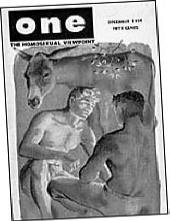 There was also a little magazine called One,
which attempted to discuss gay issues in a serious way, it had a very small
circulation. Most newsstands didn't carry it, and the postal authorities
considered it pornographic......and then in those times, who would want his name
on a subscription list in the event the police raided a gay publisher? I found
it for sale in the back corner of a bookstore on campus (Manny's (?) not the
college run bookstore!) next to Baldwin's and Vidal's books and bordering on
some shelves of Beat stuff.
There was also a little magazine called One,
which attempted to discuss gay issues in a serious way, it had a very small
circulation. Most newsstands didn't carry it, and the postal authorities
considered it pornographic......and then in those times, who would want his name
on a subscription list in the event the police raided a gay publisher? I found
it for sale in the back corner of a bookstore on campus (Manny's (?) not the
college run bookstore!) next to Baldwin's and Vidal's books and bordering on
some shelves of Beat stuff.
a 1954 issue
The first sentence of Christopher Bram's quite
wonderful book Eminent Outlaws declares: "The gay revolution began as a
literary revolution."
Despite my great liking for his book
and my respect for the work Bram has clearly put into it, I have to take this
sentence as
attention-getting hyperbole. Gore Vidal was not our George Washington, nor
Tennessee Williams our Thomas Jefferson. The gay revolution began in the post WW II
era with more and more young men and women
having the courage to uproot themselves and relocate to America's major cities,
where they increasingly dared to live public gay lives. This is not to
disparage or dismiss the important role of the fiction and poetry writers about whom
Bram
has written so well, Gore Vidal, Allen Ginsberg, James Baldwin, et al.
Far from it, because for many gay people they supplied more substantial credentials
for gay people than the gossipy hollow tales of "Well,
such-and-such-movie-star is really gay,
you know," which gay men (and women) proffered as a kind of evidence that it was
in the end okay to be homosexual..........after all, if a great actor such as
so-and-so is, it must be. Right?
These gay literary works were something substantial
and visible. The fact that major
publishers brought out the gay writing of these (and other) authors, and that
they were dealt with in nationwide critical forums seriously - even if with
hostility, meant that for some gay people these works were something akin to our gay
passports and visas. They proclaimed our territory, and
their recognition were
our credentials......How could Allen Ginsberg's Howl not be seen in this
light? [I say this fully realizing that many of today's GLBT's would flee
in shame and terror from his incantation. But I am talking about then,
not now.]
Granted there were undoubtedly definite limits to this
appropriation. For the well-educated, and/or those gay people with
literary interests such an appropriation could come easily; but for gay people
with neither of these or from a significantly different cultural background the impact of these writers might come much
later and with a different or lesser impact, or perhaps never. However, having said that, I remember that in the next
couple of years I learned of Edward Albee's plays from a clerk in a curtain
store who had no academic education beyond high school, and it was a Korean War
vet, who had gone into the military straight from high school, who introduced me
to Genet's plays The Balcony and The Blacks...probably I have
wandered into the controversial territory of "gay sensibility," and
should have smarts
enough to move on.
This was also the era of
the gay beefcake magazines, of course.
These were small pocket-sized numbers
like Bob Mizer's famous Physique Pictorial, and Vim, Tomorrow's Man,
Adonis, et al, which showed muscular guys in posing straps, and in the case
of the PP sometimes pairs of men in poses that would have given even
Helen Keller the picture of what they were interested in. A couple of large
format magazines of the same type, but with color photos, (Demi-Gods, etc.) flourished
later on, attempting to present themselves as "artistic" offshoots of bodybuilding
magazines. The Grecian Guild Pictorial, one of the pocket-size magazines,
even had a formal "creed" invoking its connection with the Classical world
that it included in its issues in an attempt to cover its legal ass. I used to
buy my copies at a hole-in-the-wall magazine store downtown around the corner
Dey's Department Store - and still approached the buying process as if I were
purchasing heroin next to a police station.
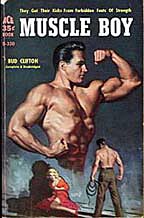 Muscle Boy, published in 1959, is
something of a cult classic. It was written by a very modestly successful author of
straight novels, Derek David Stacton, under the pseudonym Bud Clifton. It is ragingly
homophobic, concerning the adventures of a teen age bodybuilder who is lured
into posing for beefcake photos and then becomes involved - reluctantly of
course - in a world of bodybuilding sleazebags and S&M psychos of every
description.
Muscle Boy, published in 1959, is
something of a cult classic. It was written by a very modestly successful author of
straight novels, Derek David Stacton, under the pseudonym Bud Clifton. It is ragingly
homophobic, concerning the adventures of a teen age bodybuilder who is lured
into posing for beefcake photos and then becomes involved - reluctantly of
course - in a world of bodybuilding sleazebags and S&M psychos of every
description.
1959
paperback edition
One of them, a painter, is considered to have been modeled after
George Quaintance, famous for his erotic paintings. The tone of the novel is a
shade of silly purple and in each scene Our Hero is just barely saved only to
fall into more dire straits. It has a kind of Perils of Pauline quality
which is unintentionally funny overall, and yet there is also such detail and
accuracy about the milieu that you can't help wonder if Mr. Stacton wasn't as
much fascinated as repelled. It
reads like an over-eater's losing battle with cherry cheesecake. A U.K.
newspaper, The Guardian, in an article on Stacton in a 2013 issue stated
that he had "acknowledged his homosexuality" in college. He died of a stroke in
1968, while in a serious decline from colon cancer.
"The Sustaining Stream," an article in a February 1963
issue of Time magazine, was a reading list of recommended authors whose
first works had appeared within the last few years. This is the comment on
Stacton (referring to his straight books):
"David Stacton, 37, is a Nevadan who wears cowboy boots, is fond of both
Zen and bourbon, and is as nearly unknown as it is possible for a writer
to be who has written, and received critical praise for, 13 novels (all
have been published in England, five in the US.). His books, most of
which have historical themes, are masses of epigrams marinated in a
stinging mixture of metaphysics and blood. Mostly they resemble
themselves, but something similar might have been the result if the Duc
de la Rochefoucauld had written novels with plots suggested by Jack
London."
[And after
decades in total oblivion, the April 5, 2013 issue of the prestigious Times
Literary Supplement (London) announced in a page and a half review that
Stacton's work (or at least the mainstream portion of it) is available again!
His publisher, Farber, debuted its Farber Finds print-on-demand series, "which
aims to rediscover forgotten classics and neglected authors," with seven Stacton
novels. Muscle Boy, of course, is not in the lot; however, the
reviewer singles it out of Stacton's pseudonymous pulp novels as "very
entertaining."]
If the weight of the repressive and claustrophobic atmosphere surrounding homosexuality seems
unbelievable, consider that there was a virtual war still being waged against rock and roll music. For example, as he testified before a Senate
subcommittee regarding the Smathers Bill of 1958, Vance Packard, author
of the best-selling Hidden Persuaders, said that rock and roll was "inspired by what has
been called race music modified to stir the animal instinct in teenagers. Its
chief characteristics now are a heavy, unrelenting beat and a raw, savage tone.
The lyrics tend to be nonsensical or lewd, or both. Rock and roll might best be
summed up as monotony tinged with hysteria.” [Note: With the
reference to "race music" Packard is harking back to what had been until 1949
the music industry's official commercial term for music made by black musicians
for black listeners. In '49 the term was changed to Rhythm 'n' Blues
(R&B). Packard is ringing the same racist bell that columnist and book
author Lee Mortimer and collaborator, Jack Lait did repeatedly in their
Confidential exposé book series. It was the familiar alarm that
the influence of black Americans was on the verge of undermining White America.
(Forgive me, I cannot resist: The more things change, the more they stay
the same.)
Packard's comments
before the senatorial committee were a hymn of praise when compared to crooner Frank
Sinatra's testimony. Ol' Blue Eyes Sinatra howled: "Rock and roll is the
most brutal, ugly, desperate vicious form of expression it has been my
misfortune to hear. Rock n' roll smells phony and false. It is sung, played and
written for the most part by cretinous goons, and by means of its almost
imbecilic reiteration, and sly, lewd -- in plain fact, dirty -- lyrics . . . it
manages to be the martial music of every sideburned delinquent on the face of
the earth." And who would know
better about "cretinous goons" than Sinatra, who loved being chummy with Mafioso
bosses? It is also worth noting that Frankie's popularity had taken a
major dip at this point with the rise of Elvis Presley and rock n roll, and it
would be several years before he successfully re-invented himself.
And so, as the U.S. Senate was supposedly reconsidering the
Federal licensing regulations for American radio stations, it plunged into a hot
and bothered worry-fest about rock n roll and race!
NEW YORK,
NEW YORK!
Bill Kenner and I hadn't picked up our sexual
relationship after our sophomore year, however I did see him almost every day as
we had the same major and were in many of the same classes. Shortly before our
Easter break he asked me if I'd like to spend it at his home. Bill's father was
an oil exec and they lived in Scarsdale, a wealthy suburb north of New York.
God. New York! And with a gay guy. I jumped at the chance, and my parents
with much complaining allowed it. 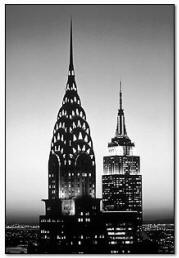
(right) 50's NYC
signature: the Midtown skyline
When I came to New York for the first time on that
spring break in 1959 one of the bars I went to, not a very popular one, was Le
Faisan d'Or. I was told that it was the single remnant from the old Bird
Circuit era, the bars that I had read about long ago in that Esquire
magazine article. (While it may possibly have dated from the same era, It
was not actually part of the circuit, which I read much later was located on
Lexington and
Third avenues in the upper east Forties/lower Fifties.) But as far as I knew then, I had seen the last gasp of 1940s/early 50s gay
life. After that time, once in a very great while, I would meet someone who was
old enough to have frequented the Bird Circuit in its heyday, and it would give
me the same "tingle" of awe I used to get out of Civil War veterans when I was a little
kid! A comparison I had sense enough not to make out
loud. [Of course today the shoe is on the other foot!]
Our first night of that Easter break Bill and I went
into town together to see my first Broadway show in New York (of which I,
surprisingly, have zero recollection) and take in a bar or two. But in the next
couple of days I took the train in by myself. (The real live New Yorker's
commuter train! Just like in the movies.) That night I met a guy in the Old
Colony on 8th Street, and since he was staying with a friend in his studio
apartment we shacked up in the Hotel Earl, which was a shopworn place near
Washington Square in those
days. The next day
we took in a matinee, and I got to see
Geraldine Page, Paul Newman and Rip Torn in Sweet Bird of Youth. (The
"Wows!" were really piling up.)
I did not visit Mary's, the bar that Donald Richie had taken Yukio Mishima to in
1952, which was only a few doors east of the Old Colony. I was warned not
to as it had not improved over the dismal
description that Richie gives it in his Japan Journals.
THE
DARK
SIDE OF THE BRIGHT LIGHTS
A night later I went into the city with Reg from the
bar clique at college, and we connected with Clem and Sam, two young gay guys
he'd met who worked in the city. We went to the Mais Oui, a dance bar in what
was then New York's extremely seedy Upper West Side. When we left the
other two stopped on the way out, and Clem and I sat in the back seat of the car
waiting for them. Suddenly the door was ripped open, lights were flashed in our
faces and we were dragged from car, and accused of having sex. The cops were
raiding the dance bar we had just been in. We were ordered to empty out our
pockets and give our names and addresses, then we were ordered to stretch over
the hood with our hands up. I was numb. The cop in charge threatened to notify
my parents when he saw I was a college student from out of town. He was
suddenly distracted by some fleeing patrons and ran in their direction. Among
the things I’d pulled out of my pockets was a small Irish souvenir rosary. The young officer
picked it up, and said, “Are you Catholic?” I said, “Yes,” very timidly, afraid
that this would bring on a storm of outrage. But he told us to pick up our
stuff and get the hell out of there before his partner came back.
Luckily, Reg and Sam showed up right at this point.
They had been hassled as they were leaving the bar, nothing else, but
when Reg heard that the cops had taken the license number of his parent's car
he was afraid they would be notified. (They weren't.) Nevertheless, we all
headed back downtown to another bar, bantering back and forth and desperately reworking what
had happened into a campy adventure.
It had been frightening, but it was no more than all
of the cautionary tales made real, and, after all, it hadn't been the worst it
could have been. So, I was really seeing all of "gay" life...just
short of getting arrested.
When I went back to the Old Colony a night or two
later the guy on the door remembered me, motioned me over and let me in ahead of
the waiting line. (Right. "Wow.") That night I got picked up by the guy who
would become my first "boyfriend." (Unfortunately, the pocket
calculator had not been invented yet.)
Bob Manahan was in his late 20s. He originally
came from a mill town in Massachusetts, had been in the Air Force in Korea and had a
divorced wife and two kids back home, whom he supported on his salary as an
airline telephone reservations agent. This was a job field that had a lot of gay men in
it, and one in which gay men could often get by "masking" their sexual
orientation rather than actually attempting to pass. However, your
professional future in these "masking" situations depended upon how close to
actual passing your act was. Bob was part of a large Irish-American, working class family and had the
mercurial wit and temperament that that background might suggest; in addition to
which he had acquired a nasty tongue that passed for "campy," along with an
obsession for Broadway and the world of celebrities and the doings of High
Society which seemed to mark many gay men that I first met in New York.
GAY NEW YORK
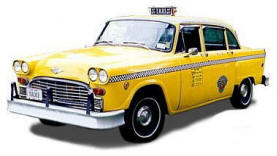
New York's famous Checker cabs
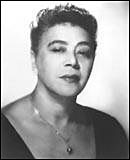 After that vacation I made frequent bus trips to the
city from Syracuse to spend weekends - or longer - with Bob. We used to go
out in a group of four or five guys, piling into Checker cabs and hopping from
gay bar to gay bar around Manhattan. Sometimes we ventured to other places
-- to hear the famous cabaret singer, Mabel Mercer,
After that vacation I made frequent bus trips to the
city from Syracuse to spend weekends - or longer - with Bob. We used to go
out in a group of four or five guys, piling into Checker cabs and hopping from
gay bar to gay bar around Manhattan. Sometimes we ventured to other places
-- to hear the famous cabaret singer, Mabel Mercer,
Mabel
Mercer
a great gay favorite (at the
RSVP, I believe); a trio of straight female performers (accordion, bass and sax, as I
recall), at a (very unwillingly) gay bar, the Floradora, in Jackson
Heights, Queens; cocktails at the Oak Room of the Plaza Hotel (an
incredibly
stiff, tight-assed place) and even a swing through the Irish bars in Rockaway
with some straight immigrant Irish girls Bob worked with. It
seemed every bit as magical as all the old movies about the Big Town I'd seen on
the Late Show, "...the hip-hooray and ballyhoo, the lullaby of
Broadway...the rumble of the subway train, the rattle of the taxis...."
Many times I was as dazzled as if I had stumbled onto the set of one of those
old films.
 Although
Bob lived an unspectacular sort of life
and on a shoestring budget, he had been to Phil Black’s famous affairs in Harlem
and to Small’s Paradise, and he also knew the gay black singer and emcee, Jimmy
Daniels, and had been at parties where aviation tycoon Grover Lohning and other
wealthy and influential men were guests. The assertions of the trio in the
campus bar about historical figures and celebrities who “really are…” had been
too distant and smacked enough of wishful thinking, I guess, for them to have mattered
to me. However, Bob’s anecdotes opened the door a crack onto a New York gay
life and gay past that was about real people and a verifiable past. I was
fascinated and eager to know more.
Although
Bob lived an unspectacular sort of life
and on a shoestring budget, he had been to Phil Black’s famous affairs in Harlem
and to Small’s Paradise, and he also knew the gay black singer and emcee, Jimmy
Daniels, and had been at parties where aviation tycoon Grover Lohning and other
wealthy and influential men were guests. The assertions of the trio in the
campus bar about historical figures and celebrities who “really are…” had been
too distant and smacked enough of wishful thinking, I guess, for them to have mattered
to me. However, Bob’s anecdotes opened the door a crack onto a New York gay
life and gay past that was about real people and a verifiable past. I was
fascinated and eager to know more.
(right) Jimmy Daniels,
bust by Richmond Barthé, circa 1933
Sometime later Bob introduced me to Jimmy Daniels at
Julius's. He was a friendly, witty man, and he radiated charm and polish
without for a moment seeming like a phony. I was as impressed as any hayseed
could have been. And yet he treated me as if we were old acquaintances
catching up on each other after an interval apart. He was then the emcee
at the Bon Soir cabaret at 40 West Eighth Street, a place where well-known
performers
appeared, and where the standing room was notorious for groping.
Jimmy Daniels had been a figure in the nightlife of the Harlem Renaissance era;
he had been photographed by the celebrated Carl Van Vechten and the famous black
sculptor Richmond Barthé had done a portrait bust of him in the early Thirties.
On the down side, while Bob and his friends clearly
lived in a bigger and more sophisticated gay world than the guys at college had
experienced, the tone of their social life was still brittle and tinged with the
same mean-spiritedness. Bob, the oldest in his crowd, and his
best friend, Jimmy, routinely regarded the world through the lorgnettes of waspish
queens. But some of the younger guys, I noticed, would sometimes try to
squelch them.
Judy Garland,
I had already learned, was the paramount gay cult
figure.
Without a doubt she was one of America's most talented and best-loved
entertainers. However, for some gay men the appeal of her incomparable talent was
deliciously enhanced by the prolonged
disintegration of her professional and personal life, sometimes to the point of maudlin, if
not abjectly mawkish, identification - the “gin and Judy” syndrome. And
surprising, to me, some of her gay "fans" reveled in making non-stop bitchy
comments about every misstep and slip-up - both real and imaginary - that she
made in her live performances, attributing them to the influence of alcohol or
drugs, and seeming to take a perverse delight in them.
However,
gay New Yorkers - and straight ones too - were also very much attracted to
performers of a different type, ones whose style was considered specific to New
York - cooler, intimate
and more sophisticated (and whose undisasterous personal lives encouraged no morbid
performance expectations.) Mabel Mercer, Sylvia Syms, Blossom Dearie and Bobby Short, for
example, always attracted gay audiences. The series of musical revues created by Leonard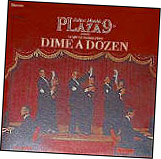 Sillman, called New Faces were eargerly awaited.
Sillman, called New Faces were eargerly awaited.
(right) Album cover of a Julius Monk review at the
Plaza Hotel
And the
Julius Monk Revue (music, comedy and satire) at the Upstairs at the Downstairs
and other venues was enormously popular with gay men too.
It was in '58 or '59 that I saw what may have been the last - or one of the
last, at least - of Monk's reviews at a space in the Plaza Hotel. The
post-WW II era of cabarets, supper clubs and jazz bars had not yet completely
faded into history.
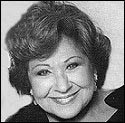
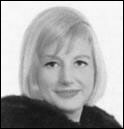

Sylvia Syms,
Blossom Dearie
and Bobby Short.
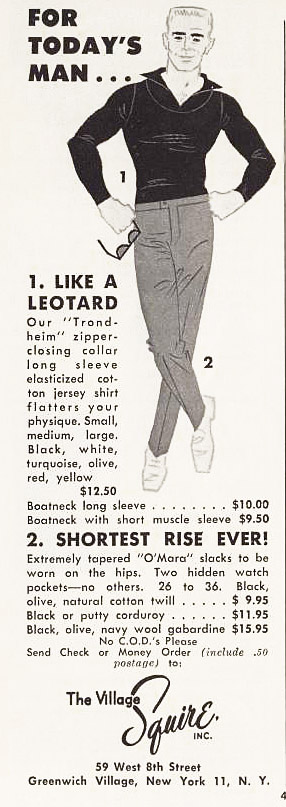 The regulation bar costume for
Bob and his friends,
when not wearing a jacket and tie, was chino pants, button-down dress shirt
(preferably blue Oxford cloth) and crew-neck sweater - the Ivy League look.
This was the first gay uniform I became aware of. Then there was the
ultra-conservative Brooks Brothers suit look. Jeans did not have a leading
place in their wardrobe. There was another style of dressing that other groups
of gay men wore: very tight pants, often with no back pockets, a short rise and
straight-cut legs (or specialty shop jeans in faded blue, wheat, black or white,
cut in the same manner) combined with colorful print shirts and a variety of
sweaters in much bolder colors than the Ivy League Shetlands. The fashion was
exemplified for me in the clothes worn by a loosely knit clique of gay men who
worked in the display departments of leading Manhattan retailers. This style of clothing
was sold in shops that catered primarily to a heavily gay
clientele - Cromwell, Casual Aire and the Village Squire.
The regulation bar costume for
Bob and his friends,
when not wearing a jacket and tie, was chino pants, button-down dress shirt
(preferably blue Oxford cloth) and crew-neck sweater - the Ivy League look.
This was the first gay uniform I became aware of. Then there was the
ultra-conservative Brooks Brothers suit look. Jeans did not have a leading
place in their wardrobe. There was another style of dressing that other groups
of gay men wore: very tight pants, often with no back pockets, a short rise and
straight-cut legs (or specialty shop jeans in faded blue, wheat, black or white,
cut in the same manner) combined with colorful print shirts and a variety of
sweaters in much bolder colors than the Ivy League Shetlands. The fashion was
exemplified for me in the clothes worn by a loosely knit clique of gay men who
worked in the display departments of leading Manhattan retailers. This style of clothing
was sold in shops that catered primarily to a heavily gay
clientele - Cromwell, Casual Aire and the Village Squire.
(right) 1959 advertisement for the
Village Squire.
(I'd seen small ads for the latter in the back
columns of Esquire, along with those for mail order houses that sold
men's bikinis, e.g. the straight beefcake model Glenn Bishop's wrap-around semi
bikinis.)
Glenn Bishop modeling one of his
"wrap-around" bikinis
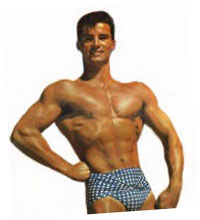 And these stores also sold a line of men’s colognes called La Bottega, produced by a young gay, black entrepreneur, Robbie Campbell, a former
dancer. The clothes were often described in their ads or in their window
displays as "Continental" or "Italian" or sometimes "French." If your crowd
didn't favor them for street wear you called them "faggy," even if you had some
in your own closet for barring in once in a while. Nevertheless, Bloomingdale’s
– a department store with a large gay clientele – ventured a bit into the same
territory in addition to its more conservative men’s styles.
And these stores also sold a line of men’s colognes called La Bottega, produced by a young gay, black entrepreneur, Robbie Campbell, a former
dancer. The clothes were often described in their ads or in their window
displays as "Continental" or "Italian" or sometimes "French." If your crowd
didn't favor them for street wear you called them "faggy," even if you had some
in your own closet for barring in once in a while. Nevertheless, Bloomingdale’s
– a department store with a large gay clientele – ventured a bit into the same
territory in addition to its more conservative men’s styles.
When Bob’s and his friends would run into the guys who
were part of the display crowd, there would be an exchange of hellos. However,
he and his friends would make viciously caustic remarks about them when out of
earshot across
the room, mostly to the effect that they were “faggy.” (And later I heard
other guys with “straight jobs” do the same.) While their style of dress may
have made these guys easily identifiable as gay, I didn’t find their actions or
mannerisms any more faggy than those among Bob’s friends -- or my own.
I think the problem may
have had at least some of its roots in the phenomenon of passing. Bob and his
friends all worked in environments where one was expected to be straight, and
although I’m sure that some probably couldn’t have passed for straight if they’d
been strapped to a ruler, still, they were expected to play
it that way. The
guys who worked in display were in a field that was practically a gay
republic, and being able to be safely openly gay at work, they could also be
that way in the rest of their life in New York without worrying about the
consequences of being discovered. I have to wonder if the dislike may have sprung from
envy.
"Oh, he has curtains," was a cautionary remark I overhead a few times. I
had already learned from the college gay crowd that I could be thankful for
being "cut." Having "curtains" (i.e., foreskin) was less of a drawback
than having your nose sprouting from the middle of your forehead, but it was
definitely not a plus. However, infant circumcision at this point had been
the prevailing medical custom for many decades in the U.S. In all of my
years of undressing in locker rooms I might have almost been able to count the
number of uncircumcised boys I'd seen, and so most guys probably felt little
necessity to observe a moment of silent thankfulness. But I had not
been one of
those guys. Having been brought into the world by an ancient doctor, I was
not "cut," and then medical reasons unfortunately required that it be done when
I was age seven. Not fun! However, standing on the threshold
of gay life, I was now grateful for having shed my blood and my prepuce late
rather than never. 
Music in the bars was provided by a juke box, of
course, although there were a very few bars that had a piano player too.
1955
Rock-ola jukebox
Beer
was about 35 cents a bottle and you were offered a glass to drink it from as
well - and some people actually used it. The days of unabashed swilling from
the bottle may have just begun, I think. But it was a custom too redolent of
lower class/blue collar habits for some people, especially if you were decked
out in that ultimate status symbol, the Brooks Brothers suit, and had just come
from the Oak Room. A few bars had dancing, but always in a back room not
visible from the front entrance. The cruise bars I was taken to had
extremely few blacks in the crowd, but a small number of Hispanics; however, the
dance bars had larger proportions of both, and the 415 might have had more
Hispanic than white or black customers.
The music selection in NYC gay bars had a heavy dollop
of Broadway show music - Ethel Merman belting out Everything's Coming Up
Roses from the musical Gypsy certainly got to be pulverizing after a
very short while. Aside from the show tunes and a
few up-tempo numbers, most of
the music was ballads. There was always an obligatory array of Judy Garland
songs, however, I can
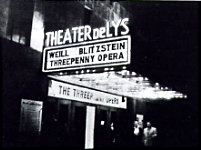 remember hearing her records hissed in Lenny's Hideaway
because they'd been played too many times in an evening. And there were often
audible groans in a bar when some new arrival played a Garland song yet again.
By the time I hit the New York bar scene steady favorites in these years were
Johnny Mathis (Chances Are), Dinah Washington (What a Difference a Day
Makes) and Frank Sinatra (I've Got You Under My Skin), who were
always represented by two or more records, and there was that recording of
Misty by Dakota Staton, which didn't leave the juke boxes for years. You'd
also find a few sides by Billie Holiday without fail, and La Vie en Rose
and Autumn Leaves by Edith Piaf. The Marc Blitzstein Off-Broadway
revival of the Threepenny Opera with Lotte Lenya and Bea Arthur (yes, the
same one), put Lenya on some jukeboxes. (The show played at the Theatre de Lys
across the street from the Café de Lys, a gay bar.)
remember hearing her records hissed in Lenny's Hideaway
because they'd been played too many times in an evening. And there were often
audible groans in a bar when some new arrival played a Garland song yet again.
By the time I hit the New York bar scene steady favorites in these years were
Johnny Mathis (Chances Are), Dinah Washington (What a Difference a Day
Makes) and Frank Sinatra (I've Got You Under My Skin), who were
always represented by two or more records, and there was that recording of
Misty by Dakota Staton, which didn't leave the juke boxes for years. You'd
also find a few sides by Billie Holiday without fail, and La Vie en Rose
and Autumn Leaves by Edith Piaf. The Marc Blitzstein Off-Broadway
revival of the Threepenny Opera with Lotte Lenya and Bea Arthur (yes, the
same one), put Lenya on some jukeboxes. (The show played at the Theatre de Lys
across the street from the Café de Lys, a gay bar.)
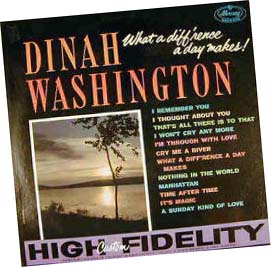 Male singers were rather thin on the juke boxes of gay bars, most of the vocal
music was sung by females. I have always assumed that the principal
reason for this was that song lyrics as sung by women spoke directly to and for gay male
romantic interests. They didn't require gay men to turn on their automatic
"gender adjustors," which took the she's that male vocalists sang and
blanked them out or understood them as he's.
Male singers were rather thin on the juke boxes of gay bars, most of the vocal
music was sung by females. I have always assumed that the principal
reason for this was that song lyrics as sung by women spoke directly to and for gay male
romantic interests. They didn't require gay men to turn on their automatic
"gender adjustors," which took the she's that male vocalists sang and
blanked them out or understood them as he's.
A very popular (and superb) '59 Dinah Washington
album
Life in NYC seemed so incredibly open compared to
Syracuse, and relative to Syracuse it certainly was. The number of bars
astounded me and the fact that they were not all buried in deserted
streets or in horrible
 neighborhoods surprised me. The bars appealed to quite
an array of "types", often characterized in terms of ethnicity, style
of dress or income. The 415 was a mostly Hispanic dance bar, Lenny's
Hideaway and the 316 drew guys in button-down shirts, Shetland sweaters and
chinos, the New Colony was called a "wrinkle room," Regents Row was "piss-elegant,"
etc., etc.
neighborhoods surprised me. The bars appealed to quite
an array of "types", often characterized in terms of ethnicity, style
of dress or income. The 415 was a mostly Hispanic dance bar, Lenny's
Hideaway and the 316 drew guys in button-down shirts, Shetland sweaters and
chinos, the New Colony was called a "wrinkle room," Regents Row was "piss-elegant,"
etc., etc.
There were only three bars I saw in 1959, all on Third
Avenue, that could have been called "leather" bars -
the Big Dollar being the most so.
These were the predecessors to the more
well-known and very popular leather bars of later years.
Nevertheless, knowledge of these places managed
to reach Europe! In its March 21, 1959 issue the Dutch newspaper
Lekvarder Courant, as part of a series of articles on the U.S., included a
short
– and not negative, account of these three
leather bars.
At this time, however, leather as a form of
dress or a subculture within the overall gay subculture, in my experience, was
very definitely looked at
askance by most gay guys. On the other hand, a reality check of the era
says that all those drawings by Tom of Finland, Etienne and other
leather-oriented artists wouldn't have been in the gay beefcake magazines if at
least
some guys
weren’t into it, and many more happy to feed their private fantasies
with it.
There was extremely little mixing between gay men and
lesbians in New York. Having to spend at least eight hours a day, five days a week playing
life by the straights' rules, I think most gay men and lesbians had zero
interest in spending their personal time with the opposite sex. Furthermore,
despite the common ground of same-sex preferences, gay men and lesbian often
seemed to march to quite different drummers. Most of the rare mixing I saw occurred
at dance bars, and even there women were a tiny fraction of the customers.
Although, one of the bars at this time, the Grapevine, had a front room for
straight people (in which you would occasionally find a very timid gay celebrity
who was still passing), a back room behind that where lesbians danced, and a
room for gay men to dance downstairs. The rest of the dance places had only one
small floor. Slow dancing (the cheek-to-cheek stuff one sees nowadays
mainly in films from the Thirties, Forties and Fifties) was the most popular, and lindy-style dancing to
upbeat music pretty much cleared the floor. There were, of course, no DJs in
dance bars - only juke boxes, as I recall you could play one record for a dime,
three for a quarter. The juke box leasing industry, like the gay bar business,
was in shady hands in New York City and many other urban areas.
 Same-sex dancing was a risky business as dance bars
were much more likely to be raided and closed. My recent experience outside the
Mais Oui was a good example of that. Thus, in dance bars there was a higher
element of tension than in the non-dance bars. If you were dancing in a gay
dance bar and the lights flashed on to full brightness that was a sign that the
police were entering the bar - or worse, that they had already entered in
undercover fashion and it was a raid. Everyone stood around nervously waiting
to see what would happen next, hoping it was just harassment (or a false alarm)
and not a full-fledged raid. (This had happened in the Mais Oui a short time
before the raid occurred.) But then the cops also seemed to enjoy periodically
stopping by non-dance bars to walk through the crowd to confer ominously with
the bartenders. These occurrences scared the bejesus out of me -
which, of course, is exactly what they were intended to do.
Same-sex dancing was a risky business as dance bars
were much more likely to be raided and closed. My recent experience outside the
Mais Oui was a good example of that. Thus, in dance bars there was a higher
element of tension than in the non-dance bars. If you were dancing in a gay
dance bar and the lights flashed on to full brightness that was a sign that the
police were entering the bar - or worse, that they had already entered in
undercover fashion and it was a raid. Everyone stood around nervously waiting
to see what would happen next, hoping it was just harassment (or a false alarm)
and not a full-fledged raid. (This had happened in the Mais Oui a short time
before the raid occurred.) But then the cops also seemed to enjoy periodically
stopping by non-dance bars to walk through the crowd to confer ominously with
the bartenders. These occurrences scared the bejesus out of me -
which, of course, is exactly what they were intended to do.
A surer way to stay open as a gay bar was to run a
restaurant that turned into a drinking/cruising place circa eleven p.m. or
so. Sometimes it was very disconcerting to have made it late to dinner
(e.g. at Lenny's Hideaway) and find the area around your table beginning to fill
up with men standing over you drinking. Some places, like Aldo's on Bleecker
Street, or the Finale just south of Sheridan Sq. at 48 Barrow St., were primarily
restaurants and their drinking crowd was pretty much confined to the immediate
bar area all evening. And then there was Regents Row, the ultimate in gay
dining piss-elegance on the East Side. It had the reputation as being a place
where older, well-heeled men brought their young dates to impress them and to be
seen with them; however, despite that not unfounded reputation you did see
tables of guys who didn't fit the stereotype.
Almost any excuse could be used to close a gay bar by
the police - and ultimately no gay place was immune. Numero uno was the fact
that it was illegal in New York State to serve homosexuals in a licensed
premises. (This denial of public accommodation had been clearly confirmed as
legal by the court in the verdict against Gloria's bar in the early 1940s.)
Exceeding the legal capacity allowed by the fire laws
was a frequent accusation (and probably often true.) Some of the more popular
bars had "doormen" who kept a head count of the occupants so that if the police
came they could not be accused of violating the fire laws. On a weekend
especially this often meant standing on the street waiting for admission,
sometimes passersby would realize that this was a gay bar and make remarks about
the guys in line and ridicule them. I can clearly remember having this
experience in front of the Old Colony on 8th Street on my first trip to New
York. The charge of serving minors was another accusation that could snuff out
a gay bar. At this time the legal drinking age in New York State was eighteen,
and there as a heavy influx of teenagers into the city from Jersey and Connecticut, where the
legal age was twenty-one, and these kids were often armed with false ID.
Soliciting for sex on the premises was a real zinger (this did not just
mean offering sex for money, i.e. prostitution), which gave rise to the
charming practice of police entrapment. And then there was always the
charge of being "disorderly," a catch-all term which covered any hint of what used to
be referred to as loose (sexual) conduct or violation of middle class standards
of socializing.
When the police did come into a bar and
take the head bartender aside, that little show of force always
generated a jolt of fear. People would shuffle around trying to decide whether
to stick it out and hope the cops were bluffing or try to slip out quickly and go
somewhere else. Sometimes trying to slip out you would find there were
cops waiting outside too, who sometimes made a few ominous remarks but usually
did no more than that. (I remember this happening at Lenny's Hideaway once, when
having sneaked quietly up the stairs to the street we ran right into more cops.) Once in a while a bar really was raided and the people
hustled out, these were usually the dance bars -- sometimes no one was taken in
by the police other than the employees, sometimes not. As I recall hearing
that the Artists
and Models ball had been raided more than once too. You could never be sure
what was going to happen -- or when -- or how far a raid would go. The
ultimate reality
was that you were always taking a chance when you went to a gay place.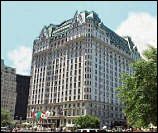 Plaza Hotel
Plaza Hotel
Straight bars and restaurants were very uneasy if they
began to get a gay clientele, and they would usually reach a point of
deliberately making their gay customers feel uncomfortable if they felt they
were in danger of "getting a reputation". The Oak Room in the Plaza
Hotel was reported to have once resorted to quietly passing out cards to
suspected gay customers which read: "The management invites you to have a drink,
and leave." It may be only apocryphal, but the story was believed. And why
not? It reflected the way things were. There was, in the
mid-Sixties, a bar in the East Village did post a sign disinviting gay
customers.
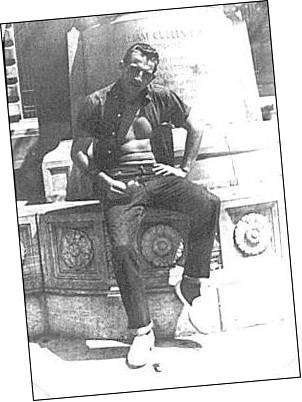 At several places in Manhattan there were "meat racks"
where guys loitered through the night to cruise each other. There were several
in Greenwich Village, the railings on the west side of Washington Square for
one. Other popular cruising grounds were the Sixth Avenue end of the concourse
under Rockefeller Center, Bryant Park behind the main branch of public library
on Fifth Avenue, the downstairs men's room at Grand Central Station and the
subway station around the restrooms of the Times Square Stop on the IRT 7th Ave.
line (the men's rest room there was referred to sometimes as the "Sunken
Gardens.")
At several places in Manhattan there were "meat racks"
where guys loitered through the night to cruise each other. There were several
in Greenwich Village, the railings on the west side of Washington Square for
one. Other popular cruising grounds were the Sixth Avenue end of the concourse
under Rockefeller Center, Bryant Park behind the main branch of public library
on Fifth Avenue, the downstairs men's room at Grand Central Station and the
subway station around the restrooms of the Times Square Stop on the IRT 7th Ave.
line (the men's rest room there was referred to sometimes as the "Sunken
Gardens.")
A guy
in Bryant Park, late 50s (photo: Edward Melcarth)
If you preferred a more bucolic atmosphere there was
the Rambles in Central Park, and along the lower end of Central Park
West in the 60s and 70s and the area around the Soldiers and Sailors monument up
on Riverside Drive. In 1959 the entire east side of Third Avenue from the lower
60s down into the 30s was a notorious area for heavy street cruising. The Upper
East Side had a lot of gay men living in it. It had become rapidly upscale
after the Third Avenue El was torn down in 1955, and new apartment buildings
were sprouting up everywhere. However at this time Third still hadn't a lot of
late night businesses that drew large milling crowds of straights, and it was lined with low-rise
19th century/early 20th century buildings. Despite the supposedly
less "obvious" lifestyle that living in this neighborhood presumed, at
night the cruising on Third tended to be abundant, and far more blatant than I would have expected in
an area favored by many gay guys who didn't want to be labeled by living in the
Village. It was in this area of Third (below 59th St.) that the only "leather"
bars (probably better described as a little leather-ish) that I knew of
were located.
Meat racks were harassed, also raided, while police
entrapment in tea rooms was a regular part of the repertoire. What fun for the kiddies!
Even so, New York was big and exciting, and it was
intoxicating to be in an environment where the quantity and visibility of gay
people seemed almost unbelievable. It was obvious that other gay men had
been similarly impressed. Most of the guys I met in the city on my first
visit had moved there from out of town, except for a small clique of
Irish-Americans who were born and raised in the Bronx, and on visits over the
next few months that continued to be the case. If the city was a gay
magnet, it was also a refuge. It was in New York in 1959 that I first
heard of the infamous Johns Committee. Johns was a state senator in
Florida who had launched an ongoing widespread gay inquisition and witch hunt at
all levels of the state's educational system. One of Rob's friends had
been a student at the Gainesville branch (or was it Jacksonville) of the State
University, and he had to drop out of school and flee as a result of these
investigations.
Despite my experience at the Mais Oui and the obvious
uneasiness and stories that everyone had about police harassment and raids, I
was conjuring up New York City as an annex of the legendary (and highly
exaggerated) gay freedom and joie de vivre of Europe.
After
life in a small town and a fairly provincial city, the fact that even in New
York City gay life was a highly contingent world wouldn't register with me .
In truth, it was as much an "underworld" as the demi-monde my imagination was
making out of it. The term "gay underworld"
is one I have come across occasionally, and it is a description that has much to
recommend it considering those times.
FOUND OUT!!!
A black youth will
most likely live with a black family, and thus, to the extent that he or
she is subjected to racism, will likely be supported by his or her
family through that experience. A gay youth is rather unlikely to
live in a gay or lesbian family, and the insult and stigmatization found
in the exterior world are likely to be found in the family as well.
Such young people will frequently be obliged to disguise themselves from
their "own" as well as from "others," and the kind of "racism" they are
subjected to is as inherent in family life as in the outside world.
Didier Eribon
I told my parents that I wanted to go to New York and
get a job for the summer, as that was where I would undoubtedly locate after
graduation. They flatly refused to hear of it, and when I brought it up again I
got a browbeating, thundering, pin-your-ears-to-the-wall tirade about the evils
of New York. Well, I knew that! but of course I could hardly have used it as a
selling point. So, I sneaked some of my favorite books and records out of the
house on a couple of trips back home, convinced that when I went my parents
would disown me. After most of my exams were over at the end of the year Reg
drove me to New York with my things on way home to the suburbs. Before I left I sent my
parents a letter telling them that I was going to the city for the summer, and
however they decided to deal with it I was prepared to live with it.
When I returned a week later to take my last exam I
found that my father had stormed into Syracuse U. like a hurricane. He had left a note on my desk,
pleading that I call them and come home just once before going to New York.
However, he had ransacked my room, and in going through everything in my desk
had come across letters from Bob. And he had obviously had no compunctions
whatsoever about reading them. My mother was to later protest that he'd only
been "looking for a piece of paper." My parents had always been inveterate
control freaks and snoops, and even the F.B.I. doesn't toss a room to find a
sheet of paper, so who was zooming who. Given a number of incidents that
occurred over the years prior to this I am quite certain that there were uneasy
feelings sometimes on my parents' part concerning my sexuality, harnessed to an
even stronger will to denial and self-deception. But now here it
was: my paramour a man, and he a Catholic (i.e. not some debauching
neo-pagan outsider.) And he had two kids! It couldn't have been
worse if he'd had two pricks.
My father, I found out, had browbeaten Bruce, the
grad student who was the Resident Advisor in the cottage, and he'd questioned
any of my dorm mates that he could corner. There was no doubt from their
reactions that he had made a major scene. Then he'd gone to the Dean of
the college I was enrolled in, demanding to know where I was, and evidently
accusing him/the university of something like dereliction of duty. While
sympathetic at first, the Dean lost his patience with my father's bullying
approach. Dean Clark informed him that college wasn't high school, and the
university did not monitor its students as if it were. And my father was asked to
leave.
I did call my parents, and I agreed to go back there
for a few days before going to New York. My father drove down to pick me up -
any evidence of the man who had taken the pleading tone in the note he'd left
was gone, he was all smoldering anger: "Get your stuff.....(after seeing that I
had only one small overnight bag) where's the rest of your stuff!?" When
I said, "New York," he looked as shocked as if this was the first he'd heard of
it. As soon as we got in the car he told me we weren't to talk to each other,
"Until we get the hell out of here." After roaring well over the speed limit
almost the entire way he finally pulled off into a deserted rest area.
He turned off the car, gripped the steering wheel and
looking straight ahead not at me, asked: "Are you a homo......................
(at least a three beat pause) sexual?"
"Yes, I am."
He was gripping the wheel so hard I thought it would
break and tics were shooting down the side of his face like lightening:
"....................are you a Communist too?"
"WHAT??!!"
Though I was petrified of him, this was a moment I
almost laughed - I knew we were lost. We had just slipped into Rod Serling's
Twilight Zone and I was sitting next to the captain of the Titanic.
When I entered the house my mother confronted me in
the dining room: "It's not true you're a homo................(same pause) sexual,
is it?"
"Yes, it is."
She ran into the living room, threw herself full length
onto the couch and cried out, "That means I'll never have any grandchildren!!"
"Fairy" I might have expected. But this:
Commie?
Failed stud bull?
I was ordered to sit down in the living room with my parents and my aunt.
She was my mother's widowed sister who had lived with
us until she had remarried when I was nine. My father began a shouting
tirade and worked himself into a fury. I was certain that he was about to
leap out of his chair and beat me to a pulp. I was shaking. I had
nothing to lose now. The worm turned...and the sonofabitchin' thing had
fangs. I shouted at the top of my
lungs: "I hate you! And I've always hated you!"
My father looked as if he'd been hit in the face with a baseball bat. He
put his hand over his eyes and sank back in his chair. Too many times he
had been a terrifying bully - I was not sorry.
Curiously neither religion nor morals seemed to figure
in their dismay. In the years to come that continued to be the
case. To my father it seemed to be almost too much to even put into words, but
I can remember that he sat there in the living room that day and said, very emphatically,"
I know it's nothing I did.....," then after a long pause he rushed to add, "and
it's not your mother's fault either." Considering the content of many of his
past battles with her, I seriously doubt that he was honestly convinced of the
truth of the latter.
In these early days my mother's focus was almost
exclusively on my destiny as a breeder. My mother loathed the body, and
was obsessed with "dirtiness" in every form imaginable; sex horrified her as if
it were like having a tarantula in your underwear. Despite an unceasing
lament about not having other children, she refused as often as possible to
have sex. It was not surprising, therefore, that my expected production of a
litter of kids loomed very large in her thoughts. In a very bold statement,
considering my mother and father's sex life, she asked, "How do you know you
don't like sex with women?" (I had not made any such declaration.) "When you
get married you'll like it." I told her that I'd done it many times and that I
knew I preferred it with guys. Her mouth dropped open and she snapped, "With
who?" With who? Four years with the same girl, and she can't guess? When I
said her name my mother let go with a series of gasping whoops and her eyes
began to bug out so that I was afraid that she was having an apoplectic fit.
Then matricide could have been added to my bill of indictment.
My aunt was the only one who thought about what being homosexual might do
to my life. She had listened as my parents and I had shouted, accused
and threatened, and then she said with a sad look on her face: "I worry that
people will want to hurt you because of it." No dummy she.
In retrospect my father's fear that I might also be a Communist as well as a
homosexual were hardly as ridiculous as I thought at the time. I was young
enough during the McCarthy era to have paid only superficial attention to what
was going on, and, thus, was ignorant of the extent to which a gay witch hunt was part of it.
However, even in the late Fifties, newspaper columnist Lee Mortimer was
able make hay with the same association. So, in the twisted way of the
times, my father had not been off the mark with his question in the car on the
way back home.
ENTER DR.
BERGLER'S DISCIPLE
Dr. Edmund Bergler! A detour on the road to the
Promised Land.
The doctor's chief claim to fame was his adamant
insistence that all homosexuals could be cured -- by his therapy, of course --
if
they wanted to be.
My parents had gotten a referral from the family
physician to a shrink in a nearby city. They pleaded that I see him before
departing the bosom of the family to live as an adulteress in New York's evil
Green-witch Village (as my parents called it.) To give us all some peace I
went, naively believing that this shrink might actually know something about
homosexuality.
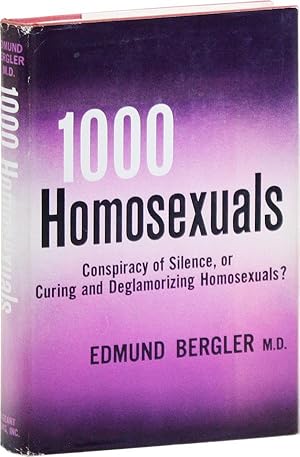 Wrong. He was an anointed disciple of Bergler -- of
whom I had never heard until then. I got a five minute précis of Bergler's
theories.
Wrong. He was an anointed disciple of Bergler -- of
whom I had never heard until then. I got a five minute précis of Bergler's
theories.
Dr. Bergler: "...deglamorizing homosexuals"
Certainly not an issue in 50's America, doctor.
I told him, yes, I understood perfectly, and he could
be of great help to me and my parents. He smile was so beaming I was the dental
equivalent of snow blinded. I went on with the same naive logic that had marked
my discussion with the priest. As I had no interest whatsoever in being cured
that was that, of course, and clearly the best thing he could do would be to explain to my
parents that I was, therefore, incurable -- which would resolve everything. Lo, these
many, many decades later I can still see his reaction. He couldn't have
been more stunned if I had pissed in his face. Somehow we had failed to
communicate, I could see that much, but damned if I knew where I went south and
he went north!
I was given a reading list of Bergler's books for my
edification and left his consulting room. As I went over to my parents, my
mother eagerly asked, "Are you better now?" I think she was hoping it was like
having a wart removed.
Then they had their turn with Dr. Bergler's disciple.
When we were driving home my mother volunteered that he had said that I did not
have "a mystical type of intelligence like most homosexuals." This was a real
kick in the kimono because for years I had gotten the highest marks in Christian
Doctrine in both Catholic parishes in town...so much for following in the
footsteps of Theresa of Avila; evidently I wasn't even to be the 20th Century's
answer to Marjery Kempe.
A year or so later I learned that Bergler was about as
close to a cult as it gets, and that his reputation in his profession was
getting to be that of a megalomaniac crank. He croaked, none too soon, and his wife made it
her life's work to carry on his they-can-be-cured crusade. Seems his wife bit
the dust only a few years ago still clutching the by now thoroughly discredited
banner of her late husband. His book is lavishly quoted on Religious Right web
sites where his half-century plus old work is their last word on homosexuality.
A sad family footnote: This good doctor's one piece of advice
to my family was "Never give even the slightest indication that you accept
anything about your son's homosexuality, fight it all the time."
They stuck to it ferociously,
and it completely
destroyed our family. Also, it caused a
vicious antagonism on my mother's part toward her sister, because my Aunt made
an effort to understand. Thus, whatever fragile bonds in my family that had survived
the terrible strains in my parents' marriage were destroyed. Such were the
fruits of Dr. Bergler, one might say.
SUMMER IN
NEW YORK
And so I arrived by Greyhound bus at the downtown
station (there were two Greyhound terminals on the west side of Manhattan then,
one on 50-something street and one on 34th, I don't recall such a thing as the
Port Authority terminal.) Bob was moving out of a large studio in the London
Terrace apartments on West 23th because his roommate had decided to return to
Texas. He took a sublet for the summer from Barbara Jones, an actress working
on a straw hat circuit. It was on the top floor of a dilapidated four-floor
building on Eighth Avenue, just below Jane Street. This was old time Greenwich
Village: a tiny, triangular-shaped room that overlooked a gay neighbor's garden in the back
and in the front faced a row of stubby 19th century
buildings across Eighth Avenue.
 Me,
in Greenwich Village apt., summer 1959
Me,
in Greenwich Village apt., summer 1959
What this flight to New York was ostensibly all about
was that Bob and I were "in love." Neither of us had given any serious thought
to what I would do to earn money. Get a job of course...but beyond that nada.
It became obvious after a couple of weeks of looking that the time to have
hunted down a summer job in New York City was a good three months before at least.
So, I changed my approach and presented myself as having quit college and
looking for a permanent job. Nothing doing! I was draft bait. Every
able-bodied male between eighteen and thirty-five had to be registered for the
draft and serve two years of military service. Upon leaving school you lost
your student classification and usually ended up being inducted into the Army
very quickly.
Furthermore, I kept getting heartfelt advice from interviewers to return to
college and get a degree. 
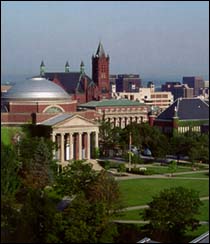 With a Farnese Hercules or a weightlifting Marlon
Brando look-alike standing next to you, shower time was an exercise in
embarrassment and eyeball control. On the other hand, I was not only still
going steady (and having sex with) the girl back home, we had it all doped out
that we'd be married after I graduated. (Right! "What fools we mortals be..."
and so on, and so on.) Meanwhile, I had some platonic dates with a very
non-threatening girl in a freshman cottage where a classmate of mine from high
school lived.
With a Farnese Hercules or a weightlifting Marlon
Brando look-alike standing next to you, shower time was an exercise in
embarrassment and eyeball control. On the other hand, I was not only still
going steady (and having sex with) the girl back home, we had it all doped out
that we'd be married after I graduated. (Right! "What fools we mortals be..."
and so on, and so on.) Meanwhile, I had some platonic dates with a very
non-threatening girl in a freshman cottage where a classmate of mine from high
school lived. 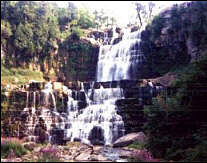
 zing sessions with Hank began as
brief stop-offs at far-flung college hangouts or country taverns that
he knew,
but soon they stretched out and we would end up late at night in more offbeat
places in the city, with only three or four of us still hanging on. The Brown Jug was one
of these, Syracuse's
valiant attempt at a jazz bar, but then he took a couple of us to the
Penguin Club in the black ghetto, which was the neighborhood that separated the
hilltop campus from Salina Street, the main drag. And one night we made a quick
trip into a place called the Bell Room, a gay bar - though I didn't quite get what it was at
the time. I had an uncomfortable sense that he had some interest in or
attraction to me - and I for him - but I pulled back from even trying to look at
it.
zing sessions with Hank began as
brief stop-offs at far-flung college hangouts or country taverns that
he knew,
but soon they stretched out and we would end up late at night in more offbeat
places in the city, with only three or four of us still hanging on. The Brown Jug was one
of these, Syracuse's
valiant attempt at a jazz bar, but then he took a couple of us to the
Penguin Club in the black ghetto, which was the neighborhood that separated the
hilltop campus from Salina Street, the main drag. And one night we made a quick
trip into a place called the Bell Room, a gay bar - though I didn't quite get what it was at
the time. I had an uncomfortable sense that he had some interest in or
attraction to me - and I for him - but I pulled back from even trying to look at
it. 

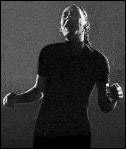


 Publication
of Kerouac's On the Road in 1957 marked the Beats debut for most
Americans. There was a tremendous outpouring of writing from the
likes of
Jack Kerouac,
Lawrence Ferlinghetti, Allen Ginsburg, Gregory Corso - and
many others then less well known. Neil Cassidy, though not a very
productive
literary talent, occupied an iconic niche: a wild man/free
spirit/lunatic/druggie ideal. He was also bisexual. Most of these men achieved
their reputations as poets, though Kerouac is more famous as a novelist.
Ginsburg's long poem Howl enjoyed great underground popularity (and was
the focus of an obscenity trial) and the novels of Kerouac, such as On the
Road, Dharma Bums and The Subterraneans rattled a great
many
Publication
of Kerouac's On the Road in 1957 marked the Beats debut for most
Americans. There was a tremendous outpouring of writing from the
likes of
Jack Kerouac,
Lawrence Ferlinghetti, Allen Ginsburg, Gregory Corso - and
many others then less well known. Neil Cassidy, though not a very
productive
literary talent, occupied an iconic niche: a wild man/free
spirit/lunatic/druggie ideal. He was also bisexual. Most of these men achieved
their reputations as poets, though Kerouac is more famous as a novelist.
Ginsburg's long poem Howl enjoyed great underground popularity (and was
the focus of an obscenity trial) and the novels of Kerouac, such as On the
Road, Dharma Bums and The Subterraneans rattled a great
many
 so-called Ivy League styles and attitudes. There were
some wardrobe innovations, as well. I sent away for a catalogue from the
Village Squire in New York - which had been confirmed as a gay store, which I
had suspected - and I parted with a chunk of my summer earnings to purchase a few
definitely non-collegiate items. These were a couple of new style tapered
tee shirts (one "tomato" and the other black), a blue and white striped,
boat-neck French
sailor's jersey and a pair of black jeans. But if these purchases suggest "bohemian", it was definitely more by way of the Hollywood musical An American in Paris
than the Beats. Next, my very short cut, brushed flat hairstyle was
allowed to grow out - and grow out - until it came as close as I dared to
being a length that suggested
it could be combed into that most non-collegiate item of all, the DA or ducktail
- pure high school and James Dean!
so-called Ivy League styles and attitudes. There were
some wardrobe innovations, as well. I sent away for a catalogue from the
Village Squire in New York - which had been confirmed as a gay store, which I
had suspected - and I parted with a chunk of my summer earnings to purchase a few
definitely non-collegiate items. These were a couple of new style tapered
tee shirts (one "tomato" and the other black), a blue and white striped,
boat-neck French
sailor's jersey and a pair of black jeans. But if these purchases suggest "bohemian", it was definitely more by way of the Hollywood musical An American in Paris
than the Beats. Next, my very short cut, brushed flat hairstyle was
allowed to grow out - and grow out - until it came as close as I dared to
being a length that suggested
it could be combed into that most non-collegiate item of all, the DA or ducktail
- pure high school and James Dean!  w of my life has left no enduring memories.
This event
did bring me, however, about as far from my previous year's adventure in college
and fraternity
w of my life has left no enduring memories.
This event
did bring me, however, about as far from my previous year's adventure in college
and fraternity


 This year I moved to a Queen Anne style cottage
complete with tower, in the commercial part of the campus. The Orange was
located just down the street on South Crouse Avenue. I began to suspect that
some of the students who hung out there were gay.
This year I moved to a Queen Anne style cottage
complete with tower, in the commercial part of the campus. The Orange was
located just down the street on South Crouse Avenue. I began to suspect that
some of the students who hung out there were gay.
 The work of Dr. Evelyn Hooker, which began to
undermine the
medical profession's stereotype of homosexuals as sick people came out in 1957,
however, I did not hear of it until the 60's; nor did I read Donald Webster
Cory's (Edward Sagarin) The Homosexual in America (1951) until the 60’s
either. Either one would have given me a broader and more positive view of gay life than the
one I was getting.
The work of Dr. Evelyn Hooker, which began to
undermine the
medical profession's stereotype of homosexuals as sick people came out in 1957,
however, I did not hear of it until the 60's; nor did I read Donald Webster
Cory's (Edward Sagarin) The Homosexual in America (1951) until the 60’s
either. Either one would have given me a broader and more positive view of gay life than the
one I was getting. She carried a clutch of shopping bags, and her scrap
books. The latter were filled with memorabilia from Daisy's days as a stripper
in the 30's - and when the mood struck her she could be quite insistent
about sharing them. Daisy had another mood that could come over her.
She carried a clutch of shopping bags, and her scrap
books. The latter were filled with memorabilia from Daisy's days as a stripper
in the 30's - and when the mood struck her she could be quite insistent
about sharing them. Daisy had another mood that could come over her.  Joe, who was a part-time student, didn't do well first
semester, dropped out and went back to Jersey. Later in the year I ended up
meeting Dominick, an older undergrad student who had bowed out of the Catholic
priesthood and was beginning his education all over again. Once he sneaked me
into his room at the Y downtown.
Joe, who was a part-time student, didn't do well first
semester, dropped out and went back to Jersey. Later in the year I ended up
meeting Dominick, an older undergrad student who had bowed out of the Catholic
priesthood and was beginning his education all over again. Once he sneaked me
into his room at the Y downtown. 
 And there were books: Giovanni's Room
(1956),
James Baldwin's first novel, which had an explicitly gay plot and protagonists,
- my first gay read - and a handful of other mainstream gay literary efforts,
e.g. The City and the Pillar. A previous, less successful novel was
James Barr's Quatrefoil (1950), unknown to me until later, and then
there was the famous lesbian-themed pioneering effort, The Well of Loneliness
(1928), by Radcliffe Hall.
And there were books: Giovanni's Room
(1956),
James Baldwin's first novel, which had an explicitly gay plot and protagonists,
- my first gay read - and a handful of other mainstream gay literary efforts,
e.g. The City and the Pillar. A previous, less successful novel was
James Barr's Quatrefoil (1950), unknown to me until later, and then
there was the famous lesbian-themed pioneering effort, The Well of Loneliness
(1928), by Radcliffe Hall.  There was also a little magazine called One,
which attempted to discuss gay issues in a serious way, it had a very small
circulation. Most newsstands didn't carry it, and the postal authorities
considered it pornographic......and then in those times, who would want his name
on a subscription list in the event the police raided a gay publisher? I found
it for sale in the back corner of a bookstore on campus (Manny's (?) not the
college run bookstore!) next to Baldwin's and Vidal's books and bordering on
some shelves of Beat stuff.
There was also a little magazine called One,
which attempted to discuss gay issues in a serious way, it had a very small
circulation. Most newsstands didn't carry it, and the postal authorities
considered it pornographic......and then in those times, who would want his name
on a subscription list in the event the police raided a gay publisher? I found
it for sale in the back corner of a bookstore on campus (Manny's (?) not the
college run bookstore!) next to Baldwin's and Vidal's books and bordering on
some shelves of Beat stuff. Muscle Boy
Muscle Boy
 After that vacation I made frequent bus trips to the
city from Syracuse to spend weekends - or longer - with Bob. We used to go
out in a group of four or five guys, piling into Checker cabs and hopping from
gay bar to gay bar around Manhattan. Sometimes we ventured to other places
-- to hear the famous cabaret singer,
After that vacation I made frequent bus trips to the
city from Syracuse to spend weekends - or longer - with Bob. We used to go
out in a group of four or five guys, piling into Checker cabs and hopping from
gay bar to gay bar around Manhattan. Sometimes we ventured to other places
-- to hear the famous cabaret singer,  Although
Bob lived an unspectacular sort of life
and on a shoestring budget, he had been to Phil Black’s famous affairs in Harlem
and to Small’s Paradise, and he also knew the gay black singer and emcee, Jimmy
Daniels, and had been at parties where aviation tycoon Grover Lohning and other
wealthy and influential men were guests. The assertions of the trio in the
campus bar about historical figures and celebrities who “really are…” had been
too distant and smacked enough of wishful thinking, I guess, for them to have mattered
to me. However, Bob’s anecdotes opened the door a crack onto a New York gay
life and gay past that was about real people and a verifiable past. I was
fascinated and eager to know more.
Although
Bob lived an unspectacular sort of life
and on a shoestring budget, he had been to Phil Black’s famous affairs in Harlem
and to Small’s Paradise, and he also knew the gay black singer and emcee, Jimmy
Daniels, and had been at parties where aviation tycoon Grover Lohning and other
wealthy and influential men were guests. The assertions of the trio in the
campus bar about historical figures and celebrities who “really are…” had been
too distant and smacked enough of wishful thinking, I guess, for them to have mattered
to me. However, Bob’s anecdotes opened the door a crack onto a New York gay
life and gay past that was about real people and a verifiable past. I was
fascinated and eager to know more.  Sillman, called New Faces were eargerly awaited.
Sillman, called New Faces were eargerly awaited. 


 The regulation bar costume for
Bob and his friends,
when not wearing a jacket and tie, was chino pants, button-down dress shirt
(preferably blue Oxford cloth) and crew-neck sweater - the Ivy League look.
This was the first gay uniform I became aware of. Then there was the
ultra-conservative Brooks Brothers suit look. Jeans did not have a leading
place in their wardrobe. There was another style of dressing that other groups
of gay men wore: very tight pants, often with no back pockets, a short rise and
straight-cut legs (or specialty shop jeans in faded blue, wheat, black or white,
cut in the same manner) combined with colorful print shirts and a variety of
sweaters in much bolder colors than the Ivy League Shetlands. The fashion was
exemplified for me in the clothes worn by a loosely knit clique of gay men who
worked in the display departments of leading Manhattan retailers. This style of clothing
was sold in shops that catered primarily to a heavily gay
clientele - Cromwell, Casual Aire and the Village Squire.
The regulation bar costume for
Bob and his friends,
when not wearing a jacket and tie, was chino pants, button-down dress shirt
(preferably blue Oxford cloth) and crew-neck sweater - the Ivy League look.
This was the first gay uniform I became aware of. Then there was the
ultra-conservative Brooks Brothers suit look. Jeans did not have a leading
place in their wardrobe. There was another style of dressing that other groups
of gay men wore: very tight pants, often with no back pockets, a short rise and
straight-cut legs (or specialty shop jeans in faded blue, wheat, black or white,
cut in the same manner) combined with colorful print shirts and a variety of
sweaters in much bolder colors than the Ivy League Shetlands. The fashion was
exemplified for me in the clothes worn by a loosely knit clique of gay men who
worked in the display departments of leading Manhattan retailers. This style of clothing
was sold in shops that catered primarily to a heavily gay
clientele - Cromwell, Casual Aire and the Village Squire.  And these stores also sold a line
And these stores also sold a line  remember hearing her records hissed in Lenny's Hideaway
because they'd been played too many times in an evening. And there were often
audible groans in a bar when some new arrival played a Garland song yet again.
By the time I hit the New York bar scene steady favorites in these years were
Johnny Mathis (
remember hearing her records hissed in Lenny's Hideaway
because they'd been played too many times in an evening. And there were often
audible groans in a bar when some new arrival played a Garland song yet again.
By the time I hit the New York bar scene steady favorites in these years were
Johnny Mathis (
 Same-sex dancing was a risky business as dance bars
were much more likely to be raided and closed. My recent experience outside the
Mais Oui was a good example of that. Thus, in dance bars there was a higher
element of tension than in the non-dance bars. If you were dancing in a gay
dance bar and the lights flashed on to full brightness that was a sign that the
police were entering the bar - or worse, that they had already entered in
undercover fashion and it was a raid. Everyone stood around nervously waiting
to see what would happen next, hoping it was just harassment (or a false alarm)
and not a full-fledged raid. (This had happened in the Mais Oui a short time
before the raid occurred.) But then the cops also seemed to enjoy periodically
stopping by non-dance bars to walk through the crowd to confer ominously with
the bartenders. These occurrences scared the bejesus out of me -
which, of course, is exactly what they were intended to do.
Same-sex dancing was a risky business as dance bars
were much more likely to be raided and closed. My recent experience outside the
Mais Oui was a good example of that. Thus, in dance bars there was a higher
element of tension than in the non-dance bars. If you were dancing in a gay
dance bar and the lights flashed on to full brightness that was a sign that the
police were entering the bar - or worse, that they had already entered in
undercover fashion and it was a raid. Everyone stood around nervously waiting
to see what would happen next, hoping it was just harassment (or a false alarm)
and not a full-fledged raid. (This had happened in the Mais Oui a short time
before the raid occurred.) But then the cops also seemed to enjoy periodically
stopping by non-dance bars to walk through the crowd to confer ominously with
the bartenders. These occurrences scared the bejesus out of me -
which, of course, is exactly what they were intended to do. At several places in Manhattan there were "meat racks"
where guys loitered through the night to cruise each other. There were several
in Greenwich Village, the railings on the west side of Washington Square for
one. Other popular cruising grounds were the Sixth Avenue end of the concourse
under Rockefeller Center, Bryant Park behind the main branch of public library
on Fifth Avenue, the downstairs men's room at Grand Central Station and the
subway station around the restrooms of the Times Square Stop on the IRT 7th Ave.
line (the men's rest room there was referred to sometimes as the "Sunken
Gardens.")
At several places in Manhattan there were "meat racks"
where guys loitered through the night to cruise each other. There were several
in Greenwich Village, the railings on the west side of Washington Square for
one. Other popular cruising grounds were the Sixth Avenue end of the concourse
under Rockefeller Center, Bryant Park behind the main branch of public library
on Fifth Avenue, the downstairs men's room at Grand Central Station and the
subway station around the restrooms of the Times Square Stop on the IRT 7th Ave.
line (the men's rest room there was referred to sometimes as the "Sunken
Gardens.") 


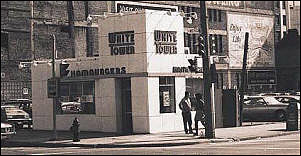
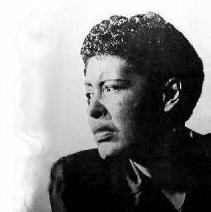 deposited into her account from record sales.
deposited into her account from record sales.
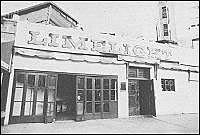

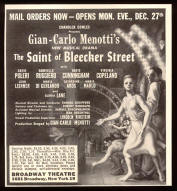 Avenue South and Sixth Avenue,
near Father Demo Square, Our Lady of Pompeii church was a monument in the
Italian village – it was the church attended by Mother Cabrini, the first U.S. citizen
to be canonized a saint. Nearby were John's Pizza, Zito's Bakery,
Faicco's Sausage Shop (which still remain) and scores of other decades-old Italian neighborhood
eateries and businesses, including Perazzo Funeral Home, which buried the Mafia
dead and thousands of less notorious Village Italians. South of Bleecker the
neighborhood remained heavily Italian, and Little Italy between the central
Village and Chinatown, was home of the annual festivals of Saint Anthony and San
Gennaro, which were celebrated with all the carnival noisiness and the fervor of
Sicily or Naples – but without the extra thousands of tourists who now clog the
streets for these events. Gay composer Gian-Carlo Menotti based his opera
The Saint of Bleecker Street, which had premiered in New York in December
'54, on life in this part of the Village.
Avenue South and Sixth Avenue,
near Father Demo Square, Our Lady of Pompeii church was a monument in the
Italian village – it was the church attended by Mother Cabrini, the first U.S. citizen
to be canonized a saint. Nearby were John's Pizza, Zito's Bakery,
Faicco's Sausage Shop (which still remain) and scores of other decades-old Italian neighborhood
eateries and businesses, including Perazzo Funeral Home, which buried the Mafia
dead and thousands of less notorious Village Italians. South of Bleecker the
neighborhood remained heavily Italian, and Little Italy between the central
Village and Chinatown, was home of the annual festivals of Saint Anthony and San
Gennaro, which were celebrated with all the carnival noisiness and the fervor of
Sicily or Naples – but without the extra thousands of tourists who now clog the
streets for these events. Gay composer Gian-Carlo Menotti based his opera
The Saint of Bleecker Street, which had premiered in New York in December
'54, on life in this part of the Village.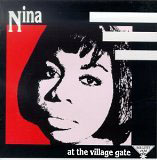
 Just off Bleecker, down Sullivan at 208, was the Triangle Social Club, the seedily
unimpressive headquarters of the Genovese Mafia family, which would be the
headquarters of their godfather, Vincent "Chin" Gigante, in years to come.
Mafia hands reached into all parts of life in the Village – not least, into its
gay life.
Just off Bleecker, down Sullivan at 208, was the Triangle Social Club, the seedily
unimpressive headquarters of the Genovese Mafia family, which would be the
headquarters of their godfather, Vincent "Chin" Gigante, in years to come.
Mafia hands reached into all parts of life in the Village – not least, into its
gay life. 
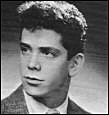
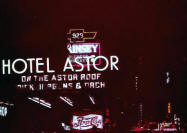
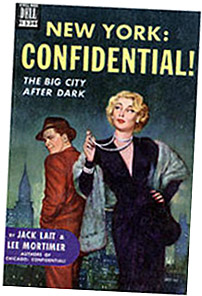
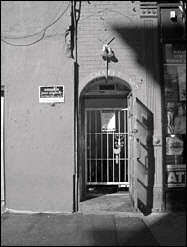

 I was less than happy with the prospect of doing it by
my lonesome. But the alternatives were maybe finding some claustrophobic
gay clique
on campus (not again, thank you)...or a year in limbo. My limited experience in
New York had given me at least a small measure of self-confidence that I'd lacked
before, so it was on down to the Bell Room after class.
I was less than happy with the prospect of doing it by
my lonesome. But the alternatives were maybe finding some claustrophobic
gay clique
on campus (not again, thank you)...or a year in limbo. My limited experience in
New York had given me at least a small measure of self-confidence that I'd lacked
before, so it was on down to the Bell Room after class. The Bell Room was a long narrow bar, with a piano up
front by the window (which was played sometimes by a much older, white-haired
man, Don) and a juke box of pop music and old standards. The gamut of customers
ran from guys in their late teens (the legal drinking age in New York then was
eighteen) to men in their forties (though there were
far, far less of the latter), and while many of them had white collar jobs from
clerks to professional salesmen, some did not. Some guys came in jacket and
tie, but more in the popular crew-neck sweater over a dress shirt or sport shirt
and chinos. Even here jeans were not as popular as they became a few years later. I
don't remember ever seeing any women customers in the Bell Room -- nor do I
recall seeing black people in any of the bars.
The Bell Room was a long narrow bar, with a piano up
front by the window (which was played sometimes by a much older, white-haired
man, Don) and a juke box of pop music and old standards. The gamut of customers
ran from guys in their late teens (the legal drinking age in New York then was
eighteen) to men in their forties (though there were
far, far less of the latter), and while many of them had white collar jobs from
clerks to professional salesmen, some did not. Some guys came in jacket and
tie, but more in the popular crew-neck sweater over a dress shirt or sport shirt
and chinos. Even here jeans were not as popular as they became a few years later. I
don't remember ever seeing any women customers in the Bell Room -- nor do I
recall seeing black people in any of the bars.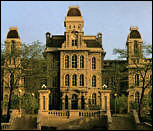 York a lot and running around had made for an academic disaster though.
York a lot and running around had made for an academic disaster though.
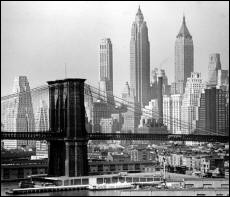 While gay life in New York had not been as
claustrophobic as that in Syracuse, there was still an ever-present quality of
vulnerability about it. From nine to five most people had to pass as straight or
at least keep a very low profile even in a tolerant environment.
While gay life in New York had not been as
claustrophobic as that in Syracuse, there was still an ever-present quality of
vulnerability about it. From nine to five most people had to pass as straight or
at least keep a very low profile even in a tolerant environment.